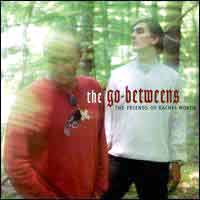| #2: Neil Young: "Silver & Gold" (Reprise, April 2000) |
|
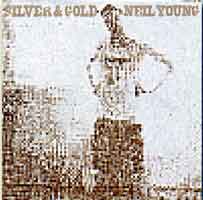 "In
a sentimental mood. Once more, Neil Young is picking up where Harvest
and Comes A Time left off. And
this time it works much better than Harvest
Moon. But he's walking an ever narrowing road. Now, it would
be real nice if he could make two records in a row in the same mood.
Forget those more and more pathetic CSN&Y reunions and focus
on what he does best. Fragile songs of love and longing, that sung
by someone else would only sound silly. You've got to keep the faith." "In
a sentimental mood. Once more, Neil Young is picking up where Harvest
and Comes A Time left off. And
this time it works much better than Harvest
Moon. But he's walking an ever narrowing road. Now, it would
be real nice if he could make two records in a row in the same mood.
Forget those more and more pathetic CSN&Y reunions and focus
on what he does best. Fragile songs of love and longing, that sung
by someone else would only sound silly. You've got to keep the faith."
Ein Tipp noch: Beim Video bzw. der DVD gleichen Namens handelt
es sich sich um einen Sololiveauftritt, der auch nur von den Liedern
her zu ca. 50% mit dieser Produktion û¥bereinstimmt. Ebenfalls
absolut lohnenswert. EnhûÊlt mit "Slowpoke"
u.a. ein Lied aus der gleichen Schaffensphase, dass aber in de Studioversion
auf dem CSN&Y-Album "Looking Forward" verûÑffentlicht
wurde.
|
| #3: Ryan Adams: "Heartbreaker" (Bloodshot, 2000) |
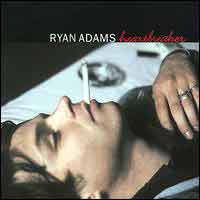 Das Solodebû¥t des ehemaligen Whiskeytown-Masterminds.
Erstklassiges Songwriting, die richtigen musikalischen Begleiter:
Gillian Welch und deren Partner
David Rawlings. Am wichtigsten aber ist Ethan Johns,
Sohn der Produzentenlegende Glyn Johns, hier fû¥r Produktion,
Tontechnik, Schlagzeug, Bass und Keyboards zustûÊndig! Neben den
Stimmen von Adams und Welch hûÑren wir auch noch in Kurzauftritten
die gûÑttliche Emmylou Harris und erstmals mit meiner Aufmerksamkeit
Kim Richey.
Das Solodebû¥t des ehemaligen Whiskeytown-Masterminds.
Erstklassiges Songwriting, die richtigen musikalischen Begleiter:
Gillian Welch und deren Partner
David Rawlings. Am wichtigsten aber ist Ethan Johns,
Sohn der Produzentenlegende Glyn Johns, hier fû¥r Produktion,
Tontechnik, Schlagzeug, Bass und Keyboards zustûÊndig! Neben den
Stimmen von Adams und Welch hûÑren wir auch noch in Kurzauftritten
die gûÑttliche Emmylou Harris und erstmals mit meiner Aufmerksamkeit
Kim Richey.

 Mehr ...
Mehr ...
|
"So ziemlich das beste Album des Jahres 2000. Hat natürlich
schon jeder." (Glitterhouse)
|
|
| "Der Plattentitel ist ein Warnsignal. Wer dieses Album
auflegt und seine verzweifelten, abgewrackten Songs hört, wird nicht
ohne Schaden davonkommen. Eine Platte wie ein singendes Gemälde von
Edward Hopper, ein tanzender Roman von Jack Kerouac oder ein gitarrespielender
Film von Robert Altman. Rein vom Klangbild her erinnert vieles an Bob Dylan
in seiner 'Blonde On Blonde'-Phase. Aber auch der Geist der Stones von 'Exile
On Mainstream' schleicht durch manche Stücke, anderswo wird man an
den psychedelischen Folk von Nick Drake oder Mark Eitzel erinnert, während
manche Balladen von Big Stars 'Third' stammen könnten. Downer-Rock,
der Höllenfreuden verursacht." ("Uncut", UK) |
|
|
As Whiskeytown finally ground to a halt in the wake of an astonishing
number of personal changes following Faithless Street (coupled with record
company problems that kept their final album, Pneumonia, from reaching
stores until two years after it was recorded), Ryan Adams ducked into
a Nashville studio for two weeks of sessions with Gillian Welch and David
Rawlings. While arch traditionalists Welch and Rawlings would hardly seem
like a likely match for alt-country's bad boy, the collaboration brought
out the best in Adams; Heartbreaker is loose, open, and heartfelt in a
way Whiskeytown's admittedly fine albums never were, and makes as strong
a case for Adams' gifts as anything his band ever released. With the exception
of the Stones-flavored "Shakedown on 9th Street" and the swaggering
"To Be Young (Is to Be Sad, Is to Be High)," Heartbreaker leaves
rock & roll on the shelf in favor of a sound that blends low-key folk-rock
with a rootsy, bluegrass-accented undertow, and while the album's production
and arrangements are subtle and spare, they make up in emotional impact
whatever they lack in volume. As a songwriter, Adams concerns himself
with the ups and downs of romance rather than the post-teenage angst that
dominated Whiskeytown's work, and "My Winding Wheel" and "Damn,
Sam (I Love a Woman That Rains)" are warmly optimistic in a way he's
rarely been before, while "Come Pick Me Up" shows he's still
eloquently in touch with heartbreak. Adams has always been a strong vocalist,
but his duet with Emmylou Harris on "Oh My Sweet Carolina" may
well be his finest hour as a singer, and the stripped-back sound of these
sessions allows him to explore the nooks and crannies of his voice, and
the results are pleasing. Whiskeytown fans who loved the "Replacements-go-twang"
crunch of "Drank Like a River" and "Yesterday's News"
might have a hard time warming up to Heartbreaker, but the strength of
the material and the performances suggest Adams is finally gaining some
much-needed maturity, and his music is all the better for it. (by Mark
Deming , AMG)
|
|
| #4: Aimee Mann: "Bachelor No. 2" (V2/Ego, Juni 2000) |
 Das Album meiner Namensvetterin (sagt man/frau das so? oder Namenscousine?)
erschien erst mit VerspûÊtung, ist nach meinem Kenntnisstand bereits
1999 aufgenommen und wie Sauerbrot den groûen Companies angeboten
und abgelehnt worden. Auf ihrem eigenen Ego-Label verûÑffentlicht
und von Richard Bransons neuestem Plattenlabel (V2=Virgin 2!) vertrieben
gibt es ein Meisterwerk zu hûÑren!
Das Album meiner Namensvetterin (sagt man/frau das so? oder Namenscousine?)
erschien erst mit VerspûÊtung, ist nach meinem Kenntnisstand bereits
1999 aufgenommen und wie Sauerbrot den groûen Companies angeboten
und abgelehnt worden. Auf ihrem eigenen Ego-Label verûÑffentlicht
und von Richard Bransons neuestem Plattenlabel (V2=Virgin 2!) vertrieben
gibt es ein Meisterwerk zu hûÑren!

 Mehr ...
Mehr ...
„Mann, die seit den ersten Charterfolgen ihrer
Wavepop-Formation `Til Tuesday Mitte der 80er stetig dagegen ankämpfen
mußte, als Pin-Up-Girl vermarktet zu werden, schreibt clevere, emotional
dichte Popsongs in der Tradition von Harry Nilsson, Randy Newman oder
Elvis Costello... Ihr gelingt das Kunststück, die kleinen wichtigen
Nebensächlichkeiten des Lebens in kurze präzise Songs zu packen,
ohne dabei in abgenutzte Floskeln zu verfallen.“
(Musik Express - 5 Sterne/Platte des Monats Februar)
It's no shock that Bachelor No. 2, or the last remains of the dodo sounds
identical to her songs for Paul Thomas Anderson's Magnolia, since it was
written and recorded at roughly the same time (the two records share four
songs). Yet Bachelor No. 2 is hardly a retread, having its own identity
and flow; it's more intimate, a little more fragile, a little more craftmanslike
-- more like an Aimee Mann record, really. That, of course, is not a bad
thing, especially since Mann has never sounded as assured as she does
here, nor has she ever had a better set of songs. Surprisingly, this cohesive
album was produced by a handful of different producers and Mann collaborated
with three songwriters (Jon Brion being the most noteworthy of both categories).
It sounds like the work of one writer and one production team, which is
testament to the fact that Mann has finally found the ideal sound to match
her literate, mildly self-deprecating, clever, melancholy, melodic style.
Bachelor No. 2 is crisp, clear, and direct, but deceptive. It's hardly
a guitar-and-voice record, there are layers of details in the arrangements,
particularly in how the various guitars and keyboards weave seamlessly
together. There has never been a better sound for her songs, and she's
never been more consistently compelling as a writer either. To call Bachelor
No. 2 a masterpiece may be overstating the matter somewhat, since an album
this unassuming (but not unconfident) is too intimate to be labeled as
such, yet it isn't hyperbole to call it the finest record Mann has made
to date.
(by Stephen Thomas Erlewine, All
Music Guide)
|
| #5: Emmylou Harris: "Red Dirt Girl" (Grapevine/Nonesuch, Okt. 2000) |
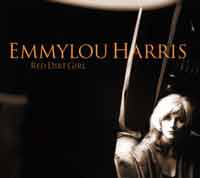

 Mehr ...
Mehr ...
|
5 Jahre nach Wrecking Ball präsentiert sie sich uns als Songwriterin,
wobei sie auf Elemente/Stimmungen des Lanois-Albums zurückgreift.
Zu den angenehm gewohnten Zutaten gehören die Auftritte von Buddy
& Julie Miller und Patty Griffin, auf einem Stück helfen Patty
Scialfa und Bruce Springsteen aus, zur festen Band zählen Malcolm
Burn, Ethan Jones und Daryl Johnson, Gastbeiträge von Kate McGarrigle
und Dave Matthews runden das Wiedertreffen alter Bekannter ab. Bis auf
ganz wenige Ausnahmen handelt es sich bei den neuen Stücken um Eigen
bzw. Co-Kompositionen (für sie, die als Interpretin von Songs anderer
berühmt wurde, eine Rarität) und dort liegt, wenn es denn einen
geben muß, der Wermutstropfen. Häufig unterlegt mit Rhythmen,
die an Wrecking Ball erinnern, zwischen zarter Ballade und gefühlvoller
Hymne angelegt, fehlt es manchen Liedern doch an Tiefe. Aber, mal ehrlich,
vergißt man solche Banalitäten nicht ohnehin, wenn diese Frau
anfängt zu singen? Und an der Wirkung dieser einzigartigen Stimme
hat sich nichts geändert. Eigentlich singt sie besser denn je...
(Glitterhouse)
|
|
|
"Jetzt, wo sie schon älter als 50 ist, hat sich Emmylou Harris
plötzlich entschlossen, sich Hals über Kopf ins Songwriting
zu stürzen. Nur ein Song hier, Patty Griffins 'One Big Love', stammt
nicht von ihr. Und das, nachdem es nach 'Wrecking Ball', das ob seiner
Daniel-Lanois-Produktion von Country-Puristen geschmäht worden war,
aber Harris ein neues Publikum erschloß, kein Zurück mehr zu
geben schien. Statt Lanois zieht nun eine andere Schlüsselfigur von
'Wrecking Ball', Malcolm Burn, die Fäden, ohne von dessen brüchigen
Klangschichten abzuweichen. Aber es ist die Handschrift von Harris, die
das Album bestimmt. Ihre paradoxerweise sowohl epischen als auch intimen
Songs schimmern und pulsieren, während kaleidoskopartige Bilder und
mysteriöse Charaktere durch das Blickfeld treiben. Nichts bleibt
hier schlicht oder vordergründig, weder die Texte noch das Arrangement
noch die Produktion. Aber Harris' größte Stärke bleibt
ihre Stimme mit ihrer verzweifelten Sehnsucht. Vermutlich hat sie nie
besser gesungen als hier." ("MOJO", UK)
|
|
| #6: Johnny Cash: "American III: Solitary Man" (American, Okt. 2000) |
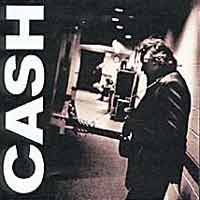 "Well, I won't back down" - schon gleich zu Beginn stellt
Johnny Cash klar, worum es geht. Der Mann geht nicht nur nicht unter,
sondern setzt mit jedem dazu gewonnenen Jahresring zu neuen Quantensprû¥ngen
an. Beim Opener handelt es sich um einen von Tom Petty fû¥r
sein Soloalbum "Full Moon Fever" geschriebenen Song, in
dem Johnny Cash das Kunstwerk gelingt, sowohl archetypisch Cash-like
als auch archetypisch Petty-like zu klingen. Die Auswahl der folgenden
Coverversionen ist einfach umwerfend: Neil Diamonds "Solitary
Man" gepaart mit U2's "One" (zuvor undenkbar,
was aus diesem Song rauszuholen ist), Will Oldham's abgrû¥ndigem
"I See A Darkness" und - um den ganzen die Krone aufzusetzen
- Nick Cave's "The Mercy Seat", dargeboten in einer
Art und Weise, die selbst Caves sagenhaftes Original vergleichsweise,
um es in der Fuûballersprache zu sagen, "û¥bermotiviert"
aussehen lûÊût. Cash nûÊmlich vertraut unter der Obhut von Rick
Rubin und zum krûÑnenden Abschluss seiner "American Recordings"-Trilogie
wieder ganz der Aura seiner rudimentûÊren Arrangements, die die
Essenz solcher Klassesongs erst wahrhaft entfalten, sowie der AutoritûÊt
seiner Stimme, die - traurig, aber wahr - wiewohl krankheitsbedingt
gezeichnet, noch eindrucksvoller die Allmacht und IntegritûÊt
des Meisters unter Beweis stellt. Gastauftritte gibt's û¥berdies
von Petty bis Oldham themselves und es ist wohl û¥berflû¥ssig
zu sagen, dass sich die zweite PlattenhûÊlfte mit eigenen Kompositionen
bestens in den zuvor gefertigten Rahmen fû¥gt. Ausnahmeaufnahme
eines Ausnahmekû¥nstlers!
"Well, I won't back down" - schon gleich zu Beginn stellt
Johnny Cash klar, worum es geht. Der Mann geht nicht nur nicht unter,
sondern setzt mit jedem dazu gewonnenen Jahresring zu neuen Quantensprû¥ngen
an. Beim Opener handelt es sich um einen von Tom Petty fû¥r
sein Soloalbum "Full Moon Fever" geschriebenen Song, in
dem Johnny Cash das Kunstwerk gelingt, sowohl archetypisch Cash-like
als auch archetypisch Petty-like zu klingen. Die Auswahl der folgenden
Coverversionen ist einfach umwerfend: Neil Diamonds "Solitary
Man" gepaart mit U2's "One" (zuvor undenkbar,
was aus diesem Song rauszuholen ist), Will Oldham's abgrû¥ndigem
"I See A Darkness" und - um den ganzen die Krone aufzusetzen
- Nick Cave's "The Mercy Seat", dargeboten in einer
Art und Weise, die selbst Caves sagenhaftes Original vergleichsweise,
um es in der Fuûballersprache zu sagen, "û¥bermotiviert"
aussehen lûÊût. Cash nûÊmlich vertraut unter der Obhut von Rick
Rubin und zum krûÑnenden Abschluss seiner "American Recordings"-Trilogie
wieder ganz der Aura seiner rudimentûÊren Arrangements, die die
Essenz solcher Klassesongs erst wahrhaft entfalten, sowie der AutoritûÊt
seiner Stimme, die - traurig, aber wahr - wiewohl krankheitsbedingt
gezeichnet, noch eindrucksvoller die Allmacht und IntegritûÊt
des Meisters unter Beweis stellt. Gastauftritte gibt's û¥berdies
von Petty bis Oldham themselves und es ist wohl û¥berflû¥ssig
zu sagen, dass sich die zweite PlattenhûÊlfte mit eigenen Kompositionen
bestens in den zuvor gefertigten Rahmen fû¥gt. Ausnahmeaufnahme
eines Ausnahmekû¥nstlers!

 Mehr ...
Mehr ...
|
"On country legend Johnny Cash's latest release,
American III: Solitary Man, his third consecutive studio album under the
production wing of studio wizard Rick Rubin, he has used a similar formula
to his two previous albums - American Recordings and Unchained . With
all the unnecessary trappings of modern country music swept to the side,
the songs on American III, like it's two predeceasors, make for a raw,
uncluttered acoustic collection of beautifully stirring tales. On American
III Cash sings of love, murder and spiritual redemption - three subjects
that have defined the Man in Black's dark mystique throughout his career.
Filled with cover songs from unlikely artists such as U2, Nick Cave, Neil
Diamond and Tom Petty, Cash effortlessly turns a good number of these
into his own. On Diamond's "Solitary Man," Cash delivers the
strongest version of this song with his stoic voice and piercing acoustic
fingerwork. On his cover of "The Mercy Seat," he takes Cave's
dark tale of an innocent prisoner facing the electric chair and makes
it seem that it could have only been penned by Cash, while his parched
take on U2's "One" works, if only for the fact that it could
be covered by anyone and still hold up as one of the strongest pop songs
ever. The only unfortunate homage to his unlikely musical offspring is
on a lifeless version of Petty's "I Won't Back Down," which
is also the opening track of the album - giving a misleading weak first
impression.
Thankfully, though, this minor error is erased when Cash turns in rich
versions of the country classics "Mary of the Wild Moor," "Wayfaring
Stranger" both featuring Sheryl Crow on accordion, and a fragile,
bittersweet take on "That Lucky Old Sun (Just Rolls Around Heaven
All Day)," a song that won him a talent contest in his youth. Pulling
out an old vaudevillian show tune, he strips away the grease paint and
stage props with just a sparse acoustic guitar on "Nobody."
The latter half of the album is filled with self-penned numbers such as
the hopeful "Field of Diamonds," featuring the shining harmonies
of Crow and June Carter Cash, and the poignant "Before My Time."
"My hands don't earn me too much gold, for security when I grow old,
but we're all the same under the grass. And God's got a place for country
trash...I'll be doing alright for country trash," he sings tongue-in-cheek,
as he pokes fun at his own Tennessee roots on "Country Trash."
He may have a bit of 'trash' running through his veins, but make no mistake
that the music that Johnny Cash has been producing in his latter years,
is nothing but pure country treasure." (Tony Bonyata)
|
|
| #7: Josh Rouse: "Home" (Rykodisc/Slow River, MûÊrz 2000) |
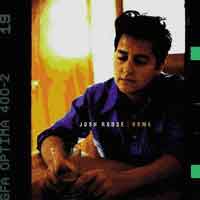 Bereits die zweite gute Slow River-VerûÑffentlichung, die innerhalb
kurzer Zeit den Weg auf diese Seite gefunden hat! Die CD habe ich
gestern aus einer Grabbelkiste gezogen, der Name des Kû¥nstlers
war mir irgendwie schon mal untergekommen, wahrscheinlich auf den
Glitterhouseseiten. Und - Volltreffer! Nicht Rock, nicht Country,
auch nicht "Americana", einfach nur wunderbare, altmodische
Songs mit viel Gitarre, Cello, Vibraphon, Trompete, E-Piano, etc.
Bereits die zweite gute Slow River-VerûÑffentlichung, die innerhalb
kurzer Zeit den Weg auf diese Seite gefunden hat! Die CD habe ich
gestern aus einer Grabbelkiste gezogen, der Name des Kû¥nstlers
war mir irgendwie schon mal untergekommen, wahrscheinlich auf den
Glitterhouseseiten. Und - Volltreffer! Nicht Rock, nicht Country,
auch nicht "Americana", einfach nur wunderbare, altmodische
Songs mit viel Gitarre, Cello, Vibraphon, Trompete, E-Piano, etc.
(05.05.2002)

 Mehr ...
Mehr ...
| „Und dann macht dieser Kerl wirklich alles richtig:
die ersten drei Songs - `Laughter´- Hit!, `Marvin Gaye´- Hit!,
`Directions´- Hit!, dann das Tempo etwas reduziert, mit phantasievollen
Arrangements Punkte gemacht, dann mit `Hey Porcupine´ wieder eine
so bittersüße Hymne, dann Violine, Vibraphon, Steel Guitar, Posaune.
Hier stimmt wirklich alles, die Dramaturgie, das Sentiment, die überraschend
klischeefreien Melodieführungen, und mit bescheidenen 38 Minuten auch
noch die Gesamtlänge. Die schmalbrüstigen uptempo-Bläsersätze
von `Laughter´ erinnern an den Instant-Soul von Orange Juice, der
Spannungsbogen von `Marvin Gaye´ an die verehrten Vulgar Boatmen,
Josh Rouses Stimme mit ihrer schönen Mischung aus verhaltener Euphorie
und aufbegehrender Melancholie an Paul Westerberg resp. Die Replacements
zwischen `Please To Meet Me´ und `All Shook Down´.... Almost
perfect!“ (Spex)
|
|
|
„Josh Rouse's second album is titled Home, but don't expect it to
provide the security and comfort associated with the place we lay our
heads at night. Rather, Home is more about the unspoken longing for one
- a distant ache permanently lodged in the marrow of Rouse's hesitantly
upbeat roots-pop. Picking up where his 1999 collaboration with Lambchop's
Kurt Wagner left off, the record subtly embellishes Rouse's spare, doe-eyed
compositions with touches of brass, organ and strings. This instrumental
detailing - courtesy of a few Lambchop members, among others - lends Rouse's
wistful gazing a certain graceful sophistication, allowing his quiet yearning
as much confidence as anguish. "I think I got it all figured out/
I think I've got it made," the Nebraska native declares on the album's
hypnotic opener "Laughter," the song's mellow bounce echoing
his happy realization. However, on "Afraid To Fail," near the
record's end, the songwriter's creeping self-doubt has begun to dismantle
his earlier certitude: "Not that I don't want to/ I'm just afraid
to fail/ And I don't want to." It's this unpretentious, plainly stated
lyricism that makes Rouse's songcraft so warmly inviting, poignantly balancing
his fear and desire with hope and resolution.“
(CMJ)
|
|
|
While this follow-up to the excellent Dressed Up Like Nebraska doesn't
offer any revelations, it's another dreamy, tuneful effort. Adding more
colors to his palette, including horns and strings, Rouse seems intent
on beefing up his sound. But he doesn't exactly break out of his trademark
ethereal vibe, which causes the album to drag at times.
(by Tim Sheridan, All
Music Guide)
|
|
| #8: Victoria Williams: "Water To Drink" (Atlantic, Aug. 2000) |
 In ihrem eigenen Studio eingespielt und produziert von Victoria und
J.C. Hopkins. Mitgewirkt haben u.a. Gatte Mark Olson,
Greg Leisz (Pedal steel), die Schlagzeuger Don Heffington,
Danny Frankel und John Convertino, Bassist David
Piltch und Geigerin Petra Haden (Tochter von Charlie Haden).
Van Dyke Parks steuert wunderbare Streicherarrangements bei.
Der Titelsong stammt von Bossanova-û¥bervater Antonio Carlos
Jobim und ist als Wahl sicherlich nicht offensichtlich (Frau Williams
mit ihrer "Piepsstimme" wagt sich an Bossa Nova?), funktioniert
aber ganz wunderbar. Victoria Williams schafft den Spagat zwischen
den scheinbar unvertrûÊglichen Genres Alternative-Rock und Broadway-Melodien.
In ihrem eigenen Studio eingespielt und produziert von Victoria und
J.C. Hopkins. Mitgewirkt haben u.a. Gatte Mark Olson,
Greg Leisz (Pedal steel), die Schlagzeuger Don Heffington,
Danny Frankel und John Convertino, Bassist David
Piltch und Geigerin Petra Haden (Tochter von Charlie Haden).
Van Dyke Parks steuert wunderbare Streicherarrangements bei.
Der Titelsong stammt von Bossanova-û¥bervater Antonio Carlos
Jobim und ist als Wahl sicherlich nicht offensichtlich (Frau Williams
mit ihrer "Piepsstimme" wagt sich an Bossa Nova?), funktioniert
aber ganz wunderbar. Victoria Williams schafft den Spagat zwischen
den scheinbar unvertrûÊglichen Genres Alternative-Rock und Broadway-Melodien.

 Mehr ...
Mehr ...
| „Ein schönes Album einer herausragenden Frau.“
(Tip Berlin) |
|
| “The result is an album that ultimately
proves Williams' place among some of the great tunesmiths in pop music.
Few can straddle the line between mainstream accessibility and quirky underground
sensibilities with such grace and agility. Beyond her writing skills, Williams
has become a confident performer. She brings a wonderfully broad range of
honest emotion to the table, and she's complemented by rock-edged instrumentation
that is wisely low on gimmicks and spacious enough to let the listener delight
in her artistry.” (Billboard) |
|
|
“No one can convey a dreamy vocal smile like Victoria Williams, but
her music is more eccentric and tough-minded than her guileless crazy quilt
of a voice suggests. A native Louisianan and later Los Angeles' roots-folk
sweetheart, Williams now records in a self-sufficient desert haven, and
this fifth major-label release is fittingly spacious. Three well-chosen
standards (including the bossa-nova title tune) display Williams' ability
but not her generosity of spirit or restless talent. Those can be found
on "Grandma's Hat Pin," a Southern-gothic portrait drawn with
impressive economy; the spavined folk-rock of "Junk"; and the
intricacy of the front-porch ramble "Little Bird," which deconstructs
itself as it unspools. Small delights abound, from the unabashedly playful
"Claude" to the similarity between Billie Holiday's lush crackle
and Williams' own on "Until the Real Thing Comes Along." Both
homespun and hymnlike, the songs on Water to Drink are the fullest expression
yet of Williams' cockeyed genius.” (Rolling Stone US) |
|
| Warren Zevon: "Life'll Kill Ya" (Rykodisc/Artemis, Jan. 2000) |
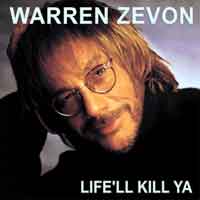 Spartanisches SpûÊtwerk eines der besten amerikanischen Singer/Songwriter!
Spartanisches SpûÊtwerk eines der besten amerikanischen Singer/Songwriter!

 Mehr ...
Mehr ...
| Among the many quotable lines on this morbidly engrossing
disc from Warren Zevon is this opening zinger from "Hostage-O":
"I can see me bound and gagged/Dragged behind the clownmobile."
These lines are delivered straight-faced to fingerpicked acoustic accompaniment,
either making the joke even funnier or leaving you wondering whether it's
a joke at all. So it goes on Life'll Kill Ya, an album that seesaws between
gallows humor and hopeful yearning, with the balance tilting toward the
former. Throughout it all, Zevon maintains his poise as a musician who came
of age on the mid-Seventies California singer-songwriter scene - just check
out his well-tempered piano playing on the grimly ironic title track or
the brisk, Dylanesque guitar-and-harmonica romp "Dirty Little Religion"
- while making like the bandleader on the Titanic with an iceberg in full
view. He forthrightly and unsentimentally skewers Elvis Presley in "Porcelain
Monkey" ("Left behind by the latest trends/Eating fried chicken
with his regicidal friends"), then turns the tables on himself in "For
My Next Trick I'll Need a Volunteer." A contemporary blues prosaically
titled "My Shit's Fucked Up" and the sardonic, faux-gospel "Fistful
of Rain" represent a fatalistic bottoming-out, but Zevon exits on a
high note with the utterly guileless and prayerful "Ourselves to Know"
and "Don't Let Us Get Sick." Moral of the story: While it's true
that life'll kill ya, don't give up without a fight. (PARKE PUTERBAUGH,
RS 834) |
|
|
Witty hits like "Werewolves of London" and "Excitable
Boy" made Zevon the clown prince of the hard-living L.A. music set
in the late '70s. More than 20 years later, he's cleaned up his living
a lot, but only toned down his lyrics a bit. The title track and "My
Shit's Fucked Up" showcase Zevon's ironic pessimism. It's uncertain
exactly what "Porcelain Monkey" is about, but this much is certain:
once it gets inside your head, good luck trying to get it out. Zevon also
does well with others' songs. A wonderfully understated "Back in
the High Life Again" eclipses Steve Winwood's original. "For
My Next Trick I'll Need a Volunteer" is great, too, but Zevon ought
to be paying Bruce Springsteen residuals for copping "The Promised
Land."
(by Mark Morgenstein, All
Music Guide)
|
|
| Motorpsycho: "Let Them Eat Cake" (Stickman, Feb. 2000) |
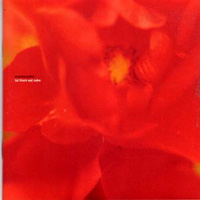 Diese ausgezeichnete Album hûÊtte ich fast vergessen! Erst durch die
dazu gehûÑrenden 1o"-EPs "The
Other Fool" und "Walking
With J" bin ich wieder darauf gekommen!
Diese ausgezeichnete Album hûÊtte ich fast vergessen! Erst durch die
dazu gehûÑrenden 1o"-EPs "The
Other Fool" und "Walking
With J" bin ich wieder darauf gekommen!
(08.03.2009)

 Mehr ...
Mehr ...
Eine Platte, auf der zu Recht das bedeutungsschwangere 2000 hintendraufsteht. Von der bl■henden Ideenvielfalt ist man beim ersten tiefen Zuh—ren halb erschlagen, man h—rt schon f—rmlich die sich ank■ndigenden Pet Sounds-Vergleiche. So hoch sollte man die MeÔlatte aber nicht legen; was die Vielfalt und Reife der musikalischen Ideen angeht, ist dies hier schon ein Riesenschritt f■r das nordische Trio, wird aber deswegen vielleicht auch den einen oder anderen Alt-Fan vor den Kopf stossen (Obwohl unser Alt-Fan Gregor die neue auch mag). In 45 Minuten/9 St■cken durchfahren Motorpsycho vieles von dem, was uns in den letzten 40 Jahren populðrer Musik gut und teuer war, angefangen bei ihrer eigenen Vergangenheit ■ber 70s Pop und Krautrock, 60s Beat und Flower-Power, bis hin zu den sich manchmal wirklich aufdrðngenden Beach Boys-Reminiszenzen, und sei es nur der Atmosphðre wegen. Da gibt es feinsinnige Songs mit weichen Gesangsharmonien und durchkonzipierte mðchtige Instrumentalparts, die sich in fast jazzige Improvisationslust steigern.
(Glitterhouse)
Mini-Symphonien von best■rzender Sch—nheit beherrschen das Bild, wahre F■llh—rner s■Ôlicher Melodien, nicht selten verziert von mehrstimmig-beatlesken Satzgesðngen. Die schweren Gitarren bleiben konsequent im Gerðteschrank. Komplettiert hat das Trio den Reigen durch ein aufwendig arrangiertes Streichquartett nebst Blðsersektion. Man lausche etwa dem von H—rnern eingeleiteten, elegischen SchluÔpunkt `30/30Ç, der verschmitzten `Big SurpriseÇ oder dem Regenspaziergang `Upstairs-DownstairsÇ - und erblasse vor Ehrfurcht. Was f■r ein Geniestreich!
(TIP Berlin)
Das Ergebnis ist ein wundervolles und reiht sich ein in die Phalanx aus jenen Bands zwischen Radiohead, Mercury Rev und den Falling Lips, die entschlossen scheinen, dem Prog-Rock seinen guten Namen zur■ckzugeben.
(WOM Journal)
|
| Steely Dan: "Two Against Natture" (Giant, Feb. 2000) |
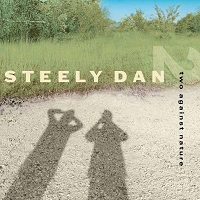

 Mehr ...
Mehr ...
Notorious for shunning concert performances, Steely Dan's improbable live reunion in the mid-'90s eventually turned into a full-fledged reunion album. Since Steely Dan fans went two decades without even the hope of a new record, the very prospect was a delight, but it was also a little worrying, since a botched comeback would tarnish the band's legacy. Fortunately, Two Against Nature is as seductive and alluring as the best of Steely Dan's later work, with a similar emphasis on classy atmosphere and groove. Pitched halfway between Gaucho and the immaculate production of Fagen's solo album Kamakiriad, it's a graceful, intricate record that works its subtle charms at its own pace. While that means it isn't a knockout on the first listen, it's a real grower -- a quietly addicting album that slowly works its way into the subconscious. It's also an uncannily natural extension of the duo's previous work, but surprisingly, it never sounds nostalgic or dated. It's clear that Becker and Fagen re-teamed because they simply enjoy working together: crafting the songs and arrangements, designing the production, shoehorning in-jokes into the lyrics, finding the exact performances that fit their specifications. In this sense, Two Against Nature is no different than any past Steely Dan effort; that's exactly why it's welcome, since they find nearly endless permutations within their signature sound. Lyrically, the album isn't quite as malicious as their '70s work, but they haven't lost their sharp humor, even on some mere throwaway lines. The real payoff, however, is musical. Each song gradually reveals its own identity through small, thrilling touches, giving the record depth and character, and fitting it comfortably into Steely Dan's acclaimed body of work. And that's as delightfully unexpected and peculiarly beautiful as anything else in their career.
(by Stephen Thomas Erlewine, All Music Guide)
|
| Neal Casal: "Anytime Tomorrow" (Glitterhouse, MûÊrz 2000) |
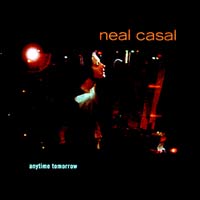 Jim Scott als Produzent, in der Begleitband L.A. Studiocracks
wie Pedalsteel-Meister Greg Leisz, Bassist Bob Glaub,
Trommler Don Heffington und John Ginty an den Keyboards.
Keine Ahnung, wie Glitterhouse sowas finanziert. Es gab zwar euphorische
Rezensionen, aber sicherlich keinen Verkaufserfolg. Und auch an mir
ging die Platte damals spurlos vorbei. Erst neulich, bei der Glitterhouse-Resteverwertung
habe ich zugegriffen und muss feststellen: eine wunderschûÑne
Platte, zu gut fû¥r diese Zeiten!
Jim Scott als Produzent, in der Begleitband L.A. Studiocracks
wie Pedalsteel-Meister Greg Leisz, Bassist Bob Glaub,
Trommler Don Heffington und John Ginty an den Keyboards.
Keine Ahnung, wie Glitterhouse sowas finanziert. Es gab zwar euphorische
Rezensionen, aber sicherlich keinen Verkaufserfolg. Und auch an mir
ging die Platte damals spurlos vorbei. Erst neulich, bei der Glitterhouse-Resteverwertung
habe ich zugegriffen und muss feststellen: eine wunderschûÑne
Platte, zu gut fû¥r diese Zeiten!
(23.08.2004)

 Mehr ...
Mehr ...
|
Das vierte reguläre Studioalbum (sieht man von den Mailorder Onlys
mal ab) von Neal Casal ist auch sein abwechslungsreichstes. Eingespielt
wurde „Anytime Tomorrow“ mit der gleichen Mannschaft, die auch
schon bei seinem Debüt zugegen war: Jim Scott (Robbie Robertson,
Hazeldine, Whiskeytown, Dylan etc.) als Produzent, Gitarren-Ass Greg Leisz,
Bob Glaub (Bass), Don Heffington (Drums) und die alten Kumpel John Ginty
an den Keyboards und Angie McKenna als Backing-Vokalistin.
Es beginnt gleich furios mit „Willow Jane“, einem Stones-mäßigen
Rocker, bei dem auch direkt ein Bläserriff für mächtig
Vorschub sorgt. Mittelschnell geht es weiter, mit „Fell On Hard Times“,
einem dieser Casal-typischen, wohligen Westcoast-Rocker. Danach wird es
erstmals sehr balladig, ja beinahe lieblich. „Luckystars“ bei
Kerzenlicht gespielt, macht ganz sicher das Herz jeder Frau weich. Ein
schön feistes Riff leitet das groovige „Sweetvine“ ein,
auch hier klassischer Blue-Eyed-Soul mit Hammond B3. Der Casal-Sound wird
einigermassen überraschend mit dem folgenden “Oceanview”
um die bis dato unbekannte Pet-Sounds-meets-5-D-Byrds-Facette erweitert,
inklusive Improvisations-Klangmalerei.
Wenn ein Song „No One Above You“ heißt, dann handelt es
sich natürlich um ein Liebeslied. Neal legt seine Seele offen und
der Song könnte jede Kuschel-Szene in einem Hollywood-Blockbuster
musikalisch untermalen.
Zeit wieder Gas zu geben: Was Neal mit „Eddy & Diamonds“
auch tut. Fünf Minuten zupackender Breitwand-Rock und ebensolche
Gitarren. Mit drei semi-akustischen Songs geht es weiter – „Just
Getting By“, „Camarillo“ und „Time Down The Wind“,
allesamt Beispiele für Neal´s gereifte Songwriterkunst. Mit
„Raining Straight Down“ schließt sich ein langsamer, fetter
und epischer Rocker an, für mich der beste Song auf dem Album. Beseelt
endet das Album mit „Too Much To Ask“.
Nicht so in sich geschlossen wie „Fade Away Diamond Time“, aber
auf jeden Fall noch ein klein wenig überzeugender als das ohnehin
großartige „Sun Rises Here“ Vorgängeralbum. (Glitterhouse)
|
|
| „Aber dieses Album sollte den Mann nachhaltig als einen
der zukunftsträchtigsten jungen Songpoeten der USA etablieren. Alles
Hype? Quatsch – es gibt hin und wieder Fälle, da muss der Kritiker
auf den Berg klettern und die frohe Kunde verbreiten: Gehet hin und höret!“
(ME/Sounds. 5 Sterne) |
|
| „...Anytime Tomorrow wächst zu einem eigenen und
traumhaften und zeitlos schönen Countryrock-Album zusammen, für
das die Repeat-Taste erfunden wurde.“ (X-Tips Bielefeld) |
|
| „Eine Art Schattenmann des US-Rock. Casal kultiviert
Weltschmerz, Entsagung, Entwurzeluung in bester Westcoast-Tradition.“
(Tip-Magazin) |
|
| „Sehr kompaktes, klassisches Rockalbum, das nie verstaubt
klingt.“ (Loop) |
|
| „Eine lässige Mixtur aus Folk, Rock und Pop. Mehr
davon!“ (Brigitte) |
|
|
Neal Casal´s new album (his seventh in just 5 years) “Anytime
Tomorrow” was recorded and mixed over 15 days during the summer of
1999 in Los Angeles. Producing was the esteemed Jim Scott (Tom Petty,
Whiskeytown, Matthew Sweet, Wilco), who performed the same function on
Casal‘s 1995 debut album, Fade Away Diamond Time. Also returning
from those sessions were the in-demand players Don Heffington (an original
member of Lone Justice, Emmylou Harris) on drums, Bob Glaub (John Fogerty)
on bass, Neal‘s longtime partner John Ginty (Jewel, Matthew Sweet)
on Hammond B3 and piano, Angie McKenna, another old friend and frequent
collaborator, on backing vocals, and Greg Leisz (k.d. lang, Joni Mitchell)
on pedal steel. How interesting that an unheralded artist like Casal could
attract such a world-class lineup, and that they‘d all keep coming
back for more. Every one of them, including Scott, also contributed to
the limited-edition 1997 anthology “Field Recordings”, as well
as 1999‘s “Basement Dreams”. The musicians and the producer
weren‘t the only talent in the room, either: director Ray Foley (an
associate of the Maysles Brothers) and his film crew shot extensive studio
and interview footage for a documentary on Casal.
With “Anytime Tomorrow”, Casal set out to make a more diverse
rock album then the folkier material on his more recent releases. When
asked about the direction of the new album, Casal says „The music
I play is rock and roll. Sure, there are elements of country, pop, blues,
folk, and other sophisticated musical forms surfacing in my music all
the time. But when it gets right down to it, I still feel like the 14-year-old
kid in my Stones T-shirt, battered Converse All-Stars, and Gibson Marauder
about to step onstage at the middle school talent show. I guess I haven‘t
progressed very much after all these years [laughs]. Really, though, I‘ve
absorbed everything from bebop to death metal, and though some people
may perceive me differently, I‘ll always consider myself a rocker.
I accidentally found myself standing next to Patti Smith in a guitar store
one day and I saw her staring lovingly at an old Les Paul Junior hanging
on the wall. As I was walking away, I heard her whisper to herself, „Man,
that‘s a cool guitar.“ It was so great to find out that I‘m
not the only one who‘s never gotten over the wicked rush of seeing
a guitar and hearing rock and roll for the first time.“
|
|
| “Seemingly without boundaries, `Anytime Tomorrow´
charmingly gladhands r&b, rock`n´roll, pop and country rock with
misleading ease.” (Classic Rock) |
|
“High summer in the LA Valley, 3,000 miles from home,
Casal and a bunch of local musician friends with impressive, female-friendly
CV´s (Joni, Emmylou, k.d., Jewel) set up camp for three weeks in a
cheap studio-sauna to record these 12 new songs.
The warmth, meteriological and interpersonal, comes through in the music.
Even the sturdier rockers – and there are several, the stripped-down
reflectiveness of last year´s excellent `Basement Dreams´ being
superseded by a fuller, fleshed-out production – have a peaceful, easy
feeling redolent of hazy California sunsets: specifically a `70s California
populated by Eagles and Jackson Brownes.
Just check out the drifting harmonica on `Fell On Hard Times´; breathy
female backing vocals on the sweetly celebratory `Luckystars´; frisky
horns on `Willow Jane´; and waltz-time bittersweetness of `Too Much
To Ask´ (one of Casal´s best, melodically and lyrically). A
great driving record and a perfect antidote for that wintry, Tupperware
sky.” (Mojo) |
|
|
A slight step back from Basement Dreams, although more slickly produced.
Some of the songs follow a predictable trajectory, and to these ears there
are obvious echoes and borrowing from other artists. The wistful/worshipful
"No One Above You" is vaguely reminiscent of Eric Clapton's
"Let It Grow." Other standout tracks are "Oceanview,"
which has a gentle dream-like Beach Boys quality, and "Just Getting
By," which could almost be a Ron Sexsmith number. By the time the
final track comes around, the excellent "Too Much to Ask," the
parlor game of spotting influences is over, and the listener is mindful
of a talent worth watching. Perhaps he should cast his net wider than
the late '60s and early '70s. When he abandons the seductive Californian
stoner persona and gets experimental, angry, or plain reckless, as on
Basement Dreams, something exciting happens. A feeling still persists
that this is a talented artist who could really catch fire. A little bit
of arson or anarchy might actually help here. (by Mark Joseph , AMG)
|
|
| A Silver Mt. Zion: "He Has Left Us Alone But Shafts Of Light Sometimes Grace The Corner Of Our Rooms" (Constellation, MûÊrz 2000) |
|
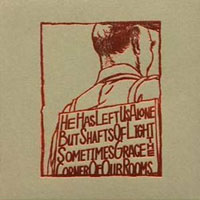 Der Bandname war noch kurz, der Titel besonders lang und die Besetzung
klein: Ephrim Menuck an Gitarre & Piano, Thierry Amar
am Kontrabass und Sophie Trudeau an der Geige spielten als
Mitglieder von Godspeed You Black Emperor im November 1999
dieses Debû¥talbum ein. Damals war sicherlich noch nicht abzusehen,
daû diese "Zweitband" mal ziemlich groû werden
und der Stammband sogar den Rang ablaufen wû¥rde.
Der Bandname war noch kurz, der Titel besonders lang und die Besetzung
klein: Ephrim Menuck an Gitarre & Piano, Thierry Amar
am Kontrabass und Sophie Trudeau an der Geige spielten als
Mitglieder von Godspeed You Black Emperor im November 1999
dieses Debû¥talbum ein. Damals war sicherlich noch nicht abzusehen,
daû diese "Zweitband" mal ziemlich groû werden
und der Stammband sogar den Rang ablaufen wû¥rde.
(07.05.2010)
Schon in kleiner Besetzung haben die drei kanadischen Musiker beim
ersten Versuch (wenn man die Godspeed-AktivitûÊten mal nicht
mitzûÊhlt) hier so etwas wie ein Meisterwerk abgeliefert, wobei
ich garnicht weiû, wie ich diese Musik beschreiben, geschweige
denn kategorisieren soll. Oder warum sie mir so an´s Herz
wûÊchst. Vielleicht folgendermaûen: Silver Mt. Zion
spielen pure, emotionale und rûÊtselhafte Musik, jenseits jeglicher
Kategorien.
(08.05.2010)

 Mehr ...
Mehr ...
Auf Constellation, das Werk eines God Speed You Black Emperor-Nebenprojektes. Auch hier diese epischen, repetetiven Hymnen, die auch den lichten Fr■hlingstag melancholisch zu stimmen wissen. Von Streichern und Piano dominierte bewegende Klanglandschaften, 8 eher lange Tracks, nur selten Stimm-Einsatz, wobei es aber der Gruppe gelingt, auch in den Wiederholungen abwechlunsgreich zu sein, auch in ruhigsten Momenten Dynamik zu erzeugen und mit Stimmungen zu fesseln. Und dabei auch noch auf ihre eigene Art faszinierende Songs zu schaffen.
(Glitterhouse)
Drei Mitglieder der epochalen Godspeed You Black Emperor verbergen sich hinter dem Projekt A Silver Mt. Zion, deren Deb■t den Quantensprung zwischen Kammermusik, Post-Rock und anderen Nettigkeiten wagt. Hier treffen klagende Geigen auf Drone-Gitarren, perlende Pianolðufe auf eingespielte Wortfetzen per Tape. Unter Mithilfe einiger Gastmusiker erschufen Pianist Efrim, Kontrabassist Thierry und Violinistin Sophie ein faszinierendes Album, das an der Schnittstelle zwischen Rock und neuer Musik funktionieren sollte. Satie und John Cale, Wim Mertens und die englischen Prog-Rocker Henry Cow kommen einem in den Sinn. Aufgeteilt ist die Platte in zwei ca. zwanzigmin■tige St■cke... Feines Album.
(M■nchner)
A Silver Mt. Zion has created a quiet album of beautiful and hypnotic melancholy, giving it the lengthy name He Has Left Us Alone, but Shafts of Light Sometimes Grace the Corner of Our Rooms. With this early 2000 release on Montreal's Constellation label, Efrim, Thierry, and Sophie of Godspeed You Black Emperor! (also on Constellation) create a sound similar to that of GYBE!, but less mournful and more gentle. Layers of string sections surround inner rings of light echoes, surrounding a core of sparsely played, reverberating guitar. This mostly instrumental album occasionally calls to mind the simple, quiet, and space-filled works of modern composer Peter Garland, as well as the solo albums of Dirty Three guitarist, Mick Turner. Efrim (piano), Thierry (contrebass), and Sophie (violin) are joined by other members of the Montreal bands Godspeed, Exhaust, and more, resulting in an often lush and raw sound that can include drums, clarinet, guitar, and tape loops. Dedicated to Efrim's late dog, Wanda, this release is in keeping with the other serious and vulnerable music found in the Constellation catalogue.
(by Joslyn Layne, All Music Guide)
|
| Patti Smith: "Gung Ho" (Arista, MûÊrz 2000) |
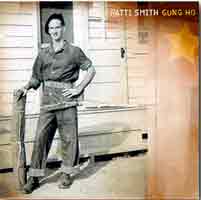 "Patti
Smith is back with a bang. Backed by a band with old and new members,
she sings songs of things old and new. The title and the cover is
referring back to WWII and the war in Vietnam. In a way she takes
off from just about where The Fugs left it with Tenderness Junction
in 1968. Out demons out! Through the years, Patti's voice has been
a powerful, convincing wail as well as a catatonic drone. This time
around she's mostly in good spirits. Great band, great production,
some really great songs. I believe she's quite pleased. So am I." "Patti
Smith is back with a bang. Backed by a band with old and new members,
she sings songs of things old and new. The title and the cover is
referring back to WWII and the war in Vietnam. In a way she takes
off from just about where The Fugs left it with Tenderness Junction
in 1968. Out demons out! Through the years, Patti's voice has been
a powerful, convincing wail as well as a catatonic drone. This time
around she's mostly in good spirits. Great band, great production,
some really great songs. I believe she's quite pleased. So am I."
|
| The Walkabouts: "Train Leaves At Eight" (Glitterhouse, Mai 2000) |
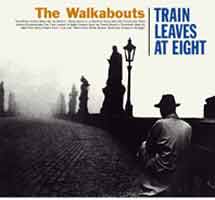

 Mehr ...
Mehr ...
|
"The album: Another name for this album might have been: Songs From
Continental Europe. That is the place these songs call home. That is the
abstraction from which they are born. However, that title would sorely
miss the point of this project. This album is not a destination; it is
an unfinished, personal journey. It is a quick flare across borders; both
imagined and sturdy. It is the faint sound of the train as it turns the
corner, away from well-worn landmarks and cultural filing cabinets. This
album is a sequence of questions: Why do the trains keep stopping at the
same stations? Why do our musical stories seem to travel in only one direction?
Why does our luggage seem so worn, when we actually go nowhere? In the
end, the only map one needs is the songs themselves. These songs came
to us over a period of years. Some arrived in unmarked parcels, some were
heard crackling in the night air. Some of them were rumours and some of
them were promises fulfilled. All of them came to us shellacked with coincidence
and kindness. We certainly must thank the songwriters, the song-givers,
the generous musicians, the recordists, and the translators for helping
us to pull this album together. Without them, we would still be waiting
for the same old train."
- Chris Eckman, Seattle, March 19, 2000
|
|
|
The Walkabouts' second collection of covers comes with a quite definite
theme, a musical tour of Europe, ranging from Greece in the South all
the way up to Norway. And it's most definitely a journey, one which suits
the darker, more introspective, and very literate nature of this Seattle
band. But the ground covered is more than geographic; not many bands could
move from Greek icon Mikis Theodorakis to Krautrockers Neu! on the same
record. But the Walkabouts, whose career has largely happened in Europe,
handle it with aplomb, throwing up plenty of changes in arrangements and
working hard to penetrate to the core of a song, even the enigmatic "Solex
in a Slipshod Style," on the face of it an odd choice, coming from
Dutch sampling queen Solex. A few of the writers might be familiar to
Americans, like Jacques Brel and Scott Walker, but the majority of the
names will be unknown -- a good thing, since the music can be judged on
the interpretation, not the original version. A few famous friends, like
R.E.M.'s Peter Buck and Los Lobos sax man Steve Berlin add contributions,
but it's the band who make it special, with Carla Torgerson's velvety
voice caressing the lyrics while Chris Eckman worries his way into others.
It might not be the most relaxing journey on offer, but it's one of the
most rewarding, a night train across a Europe, not only through the countries,
but also the hearts, minds, and souls.
(by Chris Nickson , All
Music Guide)
|
"Train Leaves At Eight" ist sowas wie ein Konzeptalbum mit
Coverversionen, ûÊhnlich wie "Satisfied
Mind" Diesesmal stammen die Lieder aber alle aus Europa (Griechenland,
Portugal, den Niederlanden, Serbien, England, Deutschland und Slovenien)
|
| Steve Earle: "Transcendental Blues" (E-Squared, Juni 2000) |
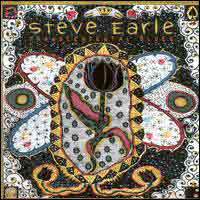

 Mehr ...
Mehr ...
| "Auf einigen Tracks erweckt Steve Earle hier seine
metaphysischen Geister zum Leben, um so seine spirituelle Seele in Lennonesker
Aufrichtigkeit bloßlegen zu können, während seine Stimme
zunehmend an Tom Pettys höhnisches Näseln erinnert. Die musikalische
Bandbreite reicht von Raga über Irish Folk bis Bluegrass." ("MOJO",
UK) |
|
| “Earle hat Folkiges à la Dylan im Programm,
ist dem Heartland-Rock eines John Mellencamp verpflichtet, spielt Sixtiesklänge
in der Nachfolge der Byrds und nimmt gekonnt Punk-Anregungen der Pogues
auf.” (Stereo) |
|
|
“Über weite Strecken von `Transcendental Blues´ kracht
und poltert es wie seit den denkwürdigen Tagen von `Copperhead Road´
und `The Hard Way´ nicht mehr. Macht immer noch tierischen Spass.
Aber Earle wäre nicht der große Americana-Zampano, der er nun
mal ist, würde er nicht von seinen Ausflügen der letzten Zeit
wunderbare Zutaten für seinen ureigenen Stilmix mitgebracht haben.
Und so gibt´s zwischendurch sogar irisches Folkgefiedel (`Steves
Last Ramble´, `The Galway Girl´), allerdings in der robusten
Gangart des Chefs; und auch wieder reinrassigen Bluegrass (`Until The
Day I Die´), gefolgt vom knochentrockenen Riff-Rocker `All Of My
Life´; zum krönenden Abschluß dann noch eine von diesen
typischen, zur Akustikgitarre vorge-tragenen und mit ein wenig Mandolinengesäusel
verzierten Gänsehaut-Balladen: `Over Yonder (Jonathan´s Song)´.
Keiner versteht sich derzeit so gut darauf, die wichtigsten Roots-Stile
mit der Energie und Dynamik des Rock`n´Roll zu verbinden. Und wer
dabei auch noch so viel charismatische Personality rüberbringt wie
dieser knorrige Mittvierziger aus Fort Monroe, Virginia, den darf man
getrost zu den ganz Großen zählen.” (ME/Sounds. 5 Sterne)
|
|
| Loretta: "Goodbye" (Naïv, Juli 2000) |
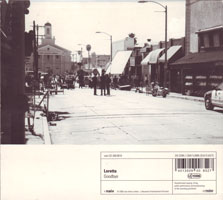 Americana aus Stuttgart! Eine tolle Band, von der man kaum was mitbekommt
und die schon mehrere vorzû¥gliche Alben verûÑffentlich hat!
Americana aus Stuttgart! Eine tolle Band, von der man kaum was mitbekommt
und die schon mehrere vorzû¥gliche Alben verûÑffentlich hat!
(01.11.2009)

 Mehr ...
Mehr ...
CD auf naiv h—ren & sehen, neues Werk der Band um den Sðnger, Gitarristen, Autoren, Keyboarder Andreas Sauer. Die kommt zwar aus Stuttgart, aber schert sich nicht drum und klingt wie eine wohl ausgewogene Mischung aus britischem Pop und amerikanischem Neo-Folk/Country. Produziert hat die Platte die Legende Thomas J. Newton, als Gðste wirkten Barbara Manning und Dave Kusworth mit. Die CD kommt in der von naiv gewohnten feinen Aufmachung (Digipak mit zusðtzlichem Papp-Schuber).
(Glitterhouse)
Abermals schenkt uns Sauer eingðngige, ja schmissige Gitarrenpopsongs ... vielleicht etwas poppiger als sein Backkatalog und mit offensichtlichen Hits. (Intro)
Yes friends, here it is: der hochoffizi—se Kommentar von Loretta-Mastermind Andreas Sauer zu jedem einzelnen Song des Albums "Goodbye":
www.day-glo.de/loretta2.htm
Stuttgart, Arkansas
Auch wenn sich die Platte "auf den ersten Blick" so anh—rt, als w■rden die Musiker von Loretta seit Jahren in der amerikanischen ødnis wohnen, so kommen sie doch aus Stuttgart im Lðndle. Aber auch dort kann eine Band die gleiche gepflegte Melancholie aufbauen, die man von der amerikanischen Verwandtschaft gewohnt ist. Titel wie "The day I cut my wrists", "She'd rather bleed" und "Everything's fucked up" lassen nicht darauf schlieÔen, daÔ "Goodbye" eine fr—hliche Platte wðre. Man darf ja auch mal depressiv sein.
Das Album ist musikalisch recht abwechslungsreich, auch wenn die ruhigeren, sparsam instrumentierten Songs ■berwiegen. Mit einem Hauch Chris & Carla hier (im wundersch—nen Beziehungsendest■ck "Carlotta's sleeping") und einer Idee Tom Petty dort, bauen Loretta im Verlaufe der Platte ein wundersch—nes, komplexes Roadmovie im Kopf auf. Auf dessen Besetzungsliste stehen Barbara Manning und Dave Kusworth (Jacobites), die wohl beide an den Aufnahmen zu "Goodbye" ihren SpaÔ gehabt haben ("That sounds like the Chipmunks"). Ob in "Everything's fucked up" ■ber eine verlorene Beziehung rðsoniert wird oder in "Here comes the night" ein Thema wie in Nick Hornbys "High fidelity" angesprochen wird ("All my records say, I got a taste [...] All my comic books say, I'm a funny guy") - jeder Song steht auch unabhðngig vom Gesamteindruck der Platte f■r sich selbst, jeder Song ist eine eigene Episode.
Wer die neueren Spielarten der amerikanischen Folkmusik mag, wird auch von dieser Platte begeistert sein. Man muÔ nicht in Amerika aufgewachsen sein muÔ, um solche Musik zu machen. Loretta plagiieren nicht, sondern haben ihren eigenen "positiv depressiven" Stil gefunden, der diese Platte zu einer der sch—neren aus diesem Genre macht, die mir in der letzten Zeit ■ber den Weg gelaufen sind. Manche Leute schreiben halt dann die besseren Songs, wenn sie gerade eher schlechter drauf sind. "Goodbye" ist, am besten bei einem Glas kalifornischen Rotwein oder einer gepflegten Beziehungskrise genossen, die perfekte Platte f■r diesen "wundervollen" Sommer (oder f■r einen beliebigen verregneten Herbsttag). Besser f■hlt man sich dadurch zwar nicht, aber man weiÔ wenigstens, daÔ es anderen Leuten genauso geht.
(Ralph Angenendt)
|
| Missouri: "It's A Glow-In-The-Dark Good Time" (iXiXeS, Juli 2000) |
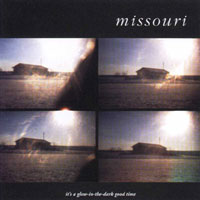 Noch mehr gute Musik aus Nû¥rnberg! Hier das Debû¥talbum der
Band, das ich mir endlich gegûÑnnt habe. Slow-Motion-Folk
mit E-Gitarren und alten analogen Keyboards, damals noch pur und weitestgehend
ohne Absicherung durch Rhythmusinstrumente. Trotzdem ist das typische
Missouri-Musik. Selten habe ich so schûÑne Musik gehûÑrt,
die fast still steht, ohne auch nur einen Moment langweilig zu sein.
Hoffenlich gibt's da bald mal was Neues, denn von Gitarrist Frank
Mollena und Keyboarder Christian Ebert waren zuletzt zu
hûÑren und zu sehen mit der Band Green
Apple Sea, die ja inzwischen auch als "Bayrische Band"
gilt, wie ich bei einem Interview mit deren SûÊnger Stefan
Prange auf Youtube erfahren durfte, der ja eigentlich aus dem
Emsland stammt, die Band jahrelang von Mû¥nster
aus betrieb und inszwischen in der frankischen Metropole
lebt. Aber deshalb gleich als adoptierte BAYERN?
Noch mehr gute Musik aus Nû¥rnberg! Hier das Debû¥talbum der
Band, das ich mir endlich gegûÑnnt habe. Slow-Motion-Folk
mit E-Gitarren und alten analogen Keyboards, damals noch pur und weitestgehend
ohne Absicherung durch Rhythmusinstrumente. Trotzdem ist das typische
Missouri-Musik. Selten habe ich so schûÑne Musik gehûÑrt,
die fast still steht, ohne auch nur einen Moment langweilig zu sein.
Hoffenlich gibt's da bald mal was Neues, denn von Gitarrist Frank
Mollena und Keyboarder Christian Ebert waren zuletzt zu
hûÑren und zu sehen mit der Band Green
Apple Sea, die ja inzwischen auch als "Bayrische Band"
gilt, wie ich bei einem Interview mit deren SûÊnger Stefan
Prange auf Youtube erfahren durfte, der ja eigentlich aus dem
Emsland stammt, die Band jahrelang von Mû¥nster
aus betrieb und inszwischen in der frankischen Metropole
lebt. Aber deshalb gleich als adoptierte BAYERN?
(13.02.2011)

 Mehr ...
Mehr ...
Nach drei Singles ist die Band aus N■rnberg nun bei iXiXeS gelandet, dem Qualitðts-Label, das uns schon Fink, Staub und Veranda Music brachte.
Mit fast schon sakraler Entspanntheit gehen sie ihre Musik an, eine Art Ambient-Gospel ist es, durchaus mit Country-Roots, aber dann auch wieder so ruhig, abgeklðrt wie Country nie war. Immer wieder erinnern sie mich an Codeine, lieber ein Ton weniger als einer zuviel.
(Glitterhouse)
|
| "Caroline Now! The Songs Of Brian Wilson And The Beach Boys" (Marina, Aug. 2000) |
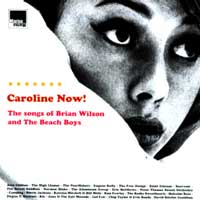

 Mehr ...
Mehr ...
|
Caroline Now!
The Songs Of Brian Wilson And The Beach Boys / Various Artists (Aug. 2000)
Das Marina-Team arbeitete 3 Jahre an der Zusammenstellung dieser 24 Song-Compilation
(78 Minuten), die sich vor allem den eher unbekannten Tracks aus Brian
Wilson´s Schatzkästchen widmet. Alle Songs sind exklusiv eingespielt
worden. Mit dabei: Eugene Kelly, Alex Chilton, June & The Exit Wounds,
The High Llamas, Camping, The Free Design, Pearlfishers, Saint Etienne,
Eric Matthews, Chip Taylor, Norman Blake, Peter Thomas Sound Orchestra,
Malcolm Ross, Jad Fair, Aluminium Group, Secret Goldfish, Stevie Jackson
(Belle & Sebastian), Kim Fowley und andere.
Das ganze kommt mit einem prachtvollen, 28-seitigen Booklet und ausführlichen
Linernotes, einem exklusiven Interview mit Brian Wilson, vielen raren
Fotos und historischen Hintergründen zu den einzelnen Beiträgen.
Komplettes Tracklisting nach dem englischen Text.
„Coverversionen scheitern regelmaessig daran, dass altbekannte Lieder
mit zu viel Ehrfurcht und zu wenig Ideen nachgeleiert werden. Das Beach
Boys-Tribut-Album 'Caroline Now!' ist eine Ausnahme. Da werden exzellente
Stuecke von Brian Wilson und Anhang so phantasievoll und versponnen vorgetragen,
wie es den Autoren gebührt. Das besorgen Pop-Legenden wie Kim Fowley
oder Alex Chilton und Fast-Pop-Stars wie Saint Etienne und The High Llamas.
Und im Booklet beschwört Obersurfer Wilson die heilende Kraft der
Musik. Wie wahr!” (Kultur Spiegel)
Almost three years in the making and one of Marina´s most ambitious
project is finally completed and it is - believe us - simply fab: Caroline
Now! celebrates the songs of Brian Wilson and The Beach Boys with a main
focus on their lesser known gems. The aim was to create a different kind
of tribute album - one that avoids the obvious hits and delves deep into
the treasure trove that is the "undiscovered work" of Brian
Wilson and The Beach Boys - including previously unreleased material.
The compilation features exclusive contributions by such eminent Wilson-o-philes
as Alex Chilton, Norman Blake (Teenage Fanclub), Kim Fowley, Saint Etienne,
Katrina Mitchell (The Pastels) and Stevie Jackson of Belle & Sebastian,
The Pearlfishers and Eric Matthews. Most of the tracks appear in quite
different sounding versions than the originals. Further highlights include
The High Llamas' electronica version of "Anna Lee, The Healer",
Eugene Kelly's Spectoresque reading of "Lady" and Peter Thomas'
bizarre and truly unique take on "Pet Sounds", the classic album's
instrumental title track. A small sensation on "Caroline Now!"
is the contribution by legendary sixties pop group The Free Design. They
have reformed especially for this occasion with their first new recording
in almost 30 years!
The 24-track-CD, total playing time: 78 minutes, is accompanied by a
28 page full colour booklet featuring extensive liner notes, historical
information for each song and an exclusive interview with Brian Wilson,
who has already given the project his blessing. Many rare and previously
unpublished photographs complete the booklet - shot by David Dalton, who
was very close to The Beach Boys, in the late sixties and who used to
share a house with Dennis Wilson.
Get ready for some good, good vibrations!
”The selection both of the 24 songs and the artists can only be
called 'exquisite'.” (Rolling Stone)
Tracklisting:
Eugene Kelly: Lady
Alex Chilton: I Wanna Pick You Up
June & The Exit Wounds: All I Wanna Do
Katrina Mitchell & Bill Wells: Wind Chimes
The High Llamas: Anna Lee, The Healer
Souvenir: Ne Dis Pas (Girl Don't Tell Me - French version)
Duglas T. Stewart: Lines
Camping: Busy Doin' Nothin'
Stevie Jackson: Good Time
The Free Design: Endless Harmony
The Pearlfishers: Go Away Boy
Saint Etienne: Stevie
The Radio Sweethearts: Honkin' Down The Highway
Eric Matthews: Lonely Sea
Kle: Rainbow Eyes
Chip Taylor & Evie Sands: Let's Put Our Hearts Together
Peter Thomas Sound Orchestra: Pet Sounds
Malcolm Ross: Heroes & Villains
Norman Blake: Only With You
The Aluminum Group: Caroline, No
Jad Fair: Do Ya
The Secret Goldfish: Big Sur
David Ritchie Coalition: Good Timin'
Kim Fowley: Almost Summer
|
|
| John Hiatt: "Crossing Muddy Waters" (Sanctuary, Sept. 2000) |
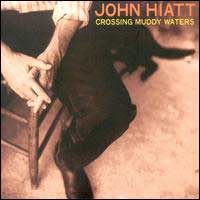 Im Trio mit Bassist Davey Faragher (Cracker) und SaitenvielkûÑnner
David Immerglû¥ck (Counting Crows), ganz ohne Trommler
und weitestgehend akustisch eingespieltes SpûÊtwerk eines der
besten amerikanischen Songschreibers mit starken Folk- und Bluesakzenten.
Im Trio mit Bassist Davey Faragher (Cracker) und SaitenvielkûÑnner
David Immerglû¥ck (Counting Crows), ganz ohne Trommler
und weitestgehend akustisch eingespieltes SpûÊtwerk eines der
besten amerikanischen Songschreibers mit starken Folk- und Bluesakzenten.

 Mehr ...
Mehr ...
|
John Hiatt's 16th effort is a marked departure from his work of the previous
25 years, and a vast improvement over 1997's disappointing Little Head.
Hiatt retrenched and recorded his first drummer-less, predominantly acoustic
record for Vanguard. It's a sympathetic match and a smart move, since
the company has a long, rich history working in the unplugged medium before
it became trendy. The result is the most natural and relaxed John Hiatt
album in years, and a welcome addition to his extensive catalog. With
just a duo of acoustic multi-instrumentalists, Davey Faragher and David
Immergluck (both longtime associates), Hiatt pulls out some of the most
earnest, down-to-earth songs of his career. He sings like a man rejuvenated,
totally at ease with his surroundings, and plays with the laid-back, homespun
honesty that has infused his best work. Although some comical lyrical
touches remain, the majority of the album is a sober reflection on lost
love ("What Do We Do Now," the title track) and the resulting
psychological scars. Hiatt's voice has never sounded better; its coarse
edges sometimes straining for high notes works perfectly with this craggy,
unpolished music. The mandolin is the most distinctive instrument here,
and its brittle, trebly, crisp tone gives the disc an underlying tension,
especially on the ballads that comprise the majority of the album. Heart-rending,
sincere, stripped down yet multi-faceted, John Hiatt has taken a step
forward by taking a small step back. Although not quite in a class with
career highlights like Bring the Family or Slow Turning, Crossing Muddy
Waters is a subtle treat and an album whose watercolor brush strokes paint
a vibrant picture of stirring delicacy.
(by Hal Horowitz, All
Music Guide)
|
|
| Bob Weir and Ratdog: "Evening Moods" (Arista/Grateful Dead, Sept. 2000) |
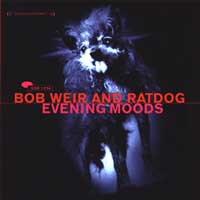 Bob
Weir's erstes Nicht-Grateful Dead Studio Album seit Mitte der 80er.
Ratdog entstand als Duo-Projekt mit Kontrabassist Rob Wasserman.
Inzwischen zur echten Band geworden gehûÑren zur festen Besetzung
neben den beiden noch Jay Lane (dr), Jeff Chimenti (keyb)
und Mark Karan (g). Als GûÊste sind u.a. Ex-Dead-Kollege
Mickey Hart, Ex-Kingfish-Kollege
Matt Kelly (harp) und Saxophonist Dave Ellis dabei. Bob
Weir's erstes Nicht-Grateful Dead Studio Album seit Mitte der 80er.
Ratdog entstand als Duo-Projekt mit Kontrabassist Rob Wasserman.
Inzwischen zur echten Band geworden gehûÑren zur festen Besetzung
neben den beiden noch Jay Lane (dr), Jeff Chimenti (keyb)
und Mark Karan (g). Als GûÊste sind u.a. Ex-Dead-Kollege
Mickey Hart, Ex-Kingfish-Kollege
Matt Kelly (harp) und Saxophonist Dave Ellis dabei.
|
| Robin Williamson: "The Seed At Zero" (ECM, Sept. 2000) |
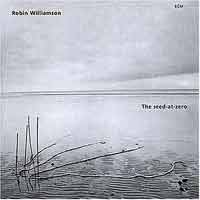 Entwarnung!
Dieses Album ist zwar auf dem "Esotherik-Jazz-Label" ECM
erschienen, aber unser lang verschollener alter Held und HûÊlfte
des ebenfalls lang vergangenen Kultduos The
Incredible String Band singt hier - vielleicht nicht mehr ganz
so vital wie vor 30 Jahren - aber immer noch sehr spannend! Entwarnung!
Dieses Album ist zwar auf dem "Esotherik-Jazz-Label" ECM
erschienen, aber unser lang verschollener alter Held und HûÊlfte
des ebenfalls lang vergangenen Kultduos The
Incredible String Band singt hier - vielleicht nicht mehr ganz
so vital wie vor 30 Jahren - aber immer noch sehr spannend!
Texte von grossen Dichtern, wie z.B. Dylan Thomas, hat er dafû¥r
vertont und trûÊgt sie allein von seiner Gitarre begleitet vor.
Ebenfalls aussergewûÑhnlich, dass nicht von ECM-Mastermind Manfred
Eicher selber, dem Vater des ECM-Sounds, sondern vom EnglûÊnder
Steve Lake (natû¥rlich nicht Greg Lake, wie ich in einer
Kritik lesen musste) produziert wurde.
Ein wunderschûÑnes Album, das vûÑllig "out of the blue"
zu uns kam! Dank dafû¥r an die Herren Eicher und Lake.
Und das mir hier keiner was von seinem "Namensvetter" Robbie
W. quatscht! |
| Godspeed You Black Emperor! "Lift Your Skinny Fists Like Antennas To Heaven" (Constellation, Okt. 2000) |
 Irgendwann im Frû¥hjahr hatte ich "Horses In The Sky"
, eine der letzten, mir noch fehlenden Platten von The Silver Mt.
Zion, meiner neuen kanadischen Lieblinxband, bestellt - zusammen
mit einem ersten Versuch bei Godspeed You Black Emperor!, der
VorlûÊufer- bzw. Parallelband von Efrim Menuck, Thierry
Amary und Sophie Trudeau. "Lift Your Skinny Fists
..." liegt "historisch" zwischen den ersten beiden
Alben von Silver Mt. Zion ("He Has
Left Us Alone But Shafts Of Light Sometimes Grace The Corner..."
und "Born Into Trouble As The
Sparks Fly Upward"), bevor die Band 2003 auf Eis gelegt wurde.
Diese Pause endet û¥brigenz im Dezember 2010 mit einer Europatournee,
die aber leider nicht in meine NûÊhe fû¥hrt und angeblich
schon lûÊngst ausverkauft ist. So was nennt man wohl einen kultigen
Geheimtipp.
Irgendwann im Frû¥hjahr hatte ich "Horses In The Sky"
, eine der letzten, mir noch fehlenden Platten von The Silver Mt.
Zion, meiner neuen kanadischen Lieblinxband, bestellt - zusammen
mit einem ersten Versuch bei Godspeed You Black Emperor!, der
VorlûÊufer- bzw. Parallelband von Efrim Menuck, Thierry
Amary und Sophie Trudeau. "Lift Your Skinny Fists
..." liegt "historisch" zwischen den ersten beiden
Alben von Silver Mt. Zion ("He Has
Left Us Alone But Shafts Of Light Sometimes Grace The Corner..."
und "Born Into Trouble As The
Sparks Fly Upward"), bevor die Band 2003 auf Eis gelegt wurde.
Diese Pause endet û¥brigenz im Dezember 2010 mit einer Europatournee,
die aber leider nicht in meine NûÊhe fû¥hrt und angeblich
schon lûÊngst ausverkauft ist. So was nennt man wohl einen kultigen
Geheimtipp.
Natû¥rlich habe ich mir, wie es sich fû¥r eine Constellation-VerûÑffentlichung
gehûÑrt, wieder die Vinylausgabe besorgt. Es handelt sich um ein
ein randvolles Doppelalbum von ca. 90 Minuten LûÊnge mit vier
ganzseitigen, wunderbar verschrobenen Instrumentalstû¥cken. Die
Musik nimmt mich genauso gefangen wie die der "anderen Band".
Puristen werden sie wohl hûÑher halten (weil ohne Gesang und noch
ein wenig verschrobener als bei "der anderen Band"), aber
das ist mir vûÑllig egal. Beide Truppen spielen in einer Klasse
fû¥r sich.
(03.10.2010)

 Mehr ...
Mehr ...
Viele Ger■chte und hohe Erwartungen begleiten das neue Werk der Instrumental-Zauberer & Stilwanderer; es ist, als schl■ge Thor mit dem Hammer auf die Tasten einer Kirchenorgel. So etwas mðchtiges wie die Langzeit-Epen Godspeeds, mit dem kompromisslosen Drang zum ultimativen Bombast, waren seit den besten Momenten der fr■hen Alben von Laibach nicht mehr zu h—ren. Weniger reaktionðr, noch entfesselter und genauso anmaÔend.
Man erarbeitet sich die grandios-noisigen Finale der jeweils lang ausgebreiteten St■cke mit langen Eingangsszenarien, die jeweils an das Einstimmen eines Philharmonie Orchesters erinnern das von Philip Glass dirigiert wird. Von Minute zu Minute wallt ein wahres, immer entfesselter aus sich selbst gespeistes Klanggewitter auf. Die Schlussemphase der 4 d■steren Symphonien entspricht purer Gewalt.
Auch als n■chterner Zuh—rer erliegt man dieser Droge. Man wird unweigerlich mitgerissen von den wahnwitzigen Hymnen. Ein Wall of Sound, ein H—llenorchesters mit einem Instrumentarium das Hephðstos im heiÔen Feuer des Vulkans der G—tter geschmiedet hat. Ein irrwitziger Sturm geordneten Lðrms, bei dem Godspeed nie die Kontrolle ■ber die von ihnen entfesselte Macht verlieren.
Auf Vinyl wird die Grundstruktur, der Plan des Projektes deutlicher, der im Kern aus vier Bl—cken besteht, die man aber aufgrund der genialen Verbindung mit den Interludes auf CD 1 und 2 gar nicht wahrnimmt. Es ist wie ein Nonstop-Rausch. Godspeed ist unverschðmt blasphemisch, diese G—tter m■ssen verr■ckt sein.
(Glitterhouse)
Es ist eine Zeitlupen-Explosion purer Musik, die hier passiert, von grandioser Melancholie und Sch—nheit, mit Melodieb—gen, die ■ber Viertelstunden hinweg tragen, mit Gebirgen von Klang und Ozeanen der Stille ein Wechselbad aus Sinfonie und scheinbaren Gerðusch-Zufall, der sich erst im groÔen Rahmen ordnet. Es ist eine Art Soundtrack ohne Film, ohne erlðuternden Abspann, und wenn die Musik verklungen ist, bleibt keine Geschichte, in die man bequem zur■ckfallen kann, sondern die Ahnung einer ■berwðltigenden Leere, die der H—rer selbst f■llen muss mit seinem eigenen Leben. (Musik Express. ******)
1994 gr■ndeten sich Godspeed You Black Emperor! in der kanadischen Stadt Quebec, mittlerweile sind sie nach Montreal umgesiedelt. Von Anfang an aber passte die vielk—pfige, nach einer japanischen Motorrad-Gang benannte Gruppe in kein gewohntes Schema der Pop-Kultur. Interviews sind rar, Werbung in eigener Sache auf ein Minimum reduziert. Trotzdem konnten Godspeed es nicht verhindern, eine Kult-Band des Gitarren-Underground zu werden.
Dabei mussten Fans und Neugierige immer wieder lange warten, um die beiden Platten f#a# undSlow Riot For New Zero Kanada zu erhalten, denn die liebevoll und ■ppig aufgemachten LPs und CDs wurden in Handarbeit gefertigt. Trotzdem verkauften sich fast 50.000 Einheiten und zu Konzerten kommen schon mal 3.000 Menschen. "Die letzte groÔe Band des ausgehenden Jahrtausend" nannte sie die englische Musikzeitschrift NME und die Plattenfirmen wurden aufmerksam. Godspeed aber halten sich von den M■hlrðdern der Pop-Industrie fern, sie investieren ihre Kraft lieber in unzðhlige Konzerte und ihre Musik -- groÔartige, kaum zu greifende Musik.
Mit unzðhligen Gitarren, Streichern und Drums bauen GYBE gewaltige Wall Of Sounds auf, deren Massivitðt insbesondere dann zum Tragen kommt, wenn der Verstðrker zu kollabieren droht. St■rzen die Klangwðlle ein, so erschlagenen die Teile nicht, sondern dr■cken sanft zu Boden. Nun erhðlt die ohrenbetðubende Lautstðrke ihre zweite Bedeutung: Es bleibt kein Tr■mmerfeld zur■ck, sondern auch die immer wieder folgenden Ruhepassagen mit kammermusikðhnlichen, nachdenklichen, fast traurigen Instrumentierungen werden verstðrkt. So ist es kaum m—glich, sich dieser Umklammerung zu entziehen. Godspeed verfolgen dieses dramaturgische Konzept der meist sehr langen Songs ðhnlich wie ihre schottischen Freunde Mogwai schon lange. Ausgereizt aber scheint es nicht.
So kommt es in den 88 Minuten, die auf vier St■cke und zwei CDs verteilt sind, nie zu Erm■dungserscheinungen. Das Gegenteil ist der Fall. Durch den komplexen, vielschichtigen Aufbau, die immer wieder wechselnden Stimmungen, fehlenden Hooklines und Tempoverlagerungen verliert sich das Gef■hl f■r Wiedererkennungsmomente. Alles ist immer Instrumentalsound mit Gerðusch- und Worteinspielungen. Der H—rer befindet sich irgendwo dazwischen, eine Flucht ist zwecklos. Was f■r Musik!
(Sven Niechziol, amazon.de)
Lift Your Skinny Fists Like Antennas to Heaven, the much-anticipated follow-up to Godspeed You Black Emperor's Slow Riot, is a double-disc achievement of four works (each with multiple parts): "Storm," "Static," "Sleep," and "Antennas to Heaven." It is a windfall for any fan of ambient pop, orchestral rock, space rock, or simply lush string arrangements who understands how powerful love, melancholy, and frustration can be. The main complaint voiced by critics of Godspeed's music is that their works just repeat the same pattern: start out sparse and slow, build-build-build, crescendo. While there are certainly crescendos, there is no such predictable pattern repeated among the works on Lift Your Skinny Fists Like Antennas to Heaven -- it's loaded with dynamics, unexpected sections, strong emotions and beauty.
The album opener, "Storm," is a leap for GYBE! that, alone, makes this release worth getting. It's a rapturous work that rises with a potent melancholy, driven by heartrending emotions. "Storm" vents a powerful frustration (each listener can insert their own reasons why) with majestic screams of strings, guitars, and layers, resulting in a climactic and passionate soaring. It eventually winds down into an exhausted aftermath of piano, underlying drones, and frustrated rants. The second piece, "Static," is a wandering, isolationist piece of bleak expanses shaded with darker emotions, but the remaining two works raise the album back up to the impressive standard set by the opening cut, though with less furor and even more loveliness. "Sleep" opens with an elderly gentleman reminiscing about Coney Island, and his frank and amusing narration briefly recalls the recordings of David Greenberger and scenes from the documentary Vernon, FL. This narration is followed by a slow and melodic piece featuring a pseudo-theremin effect amidst all of the other instrumentation. "Antennas to Heaven" opens with someone playing acoustic guitar, singing "What'll We Do with the Baby-O," soon washed over with sound, which then gives way to a brief chorus of glockenspiels, and on.
During most of Lift Your Skinny Fists Like Antennas to Heaven, musical and emotional opposites alternate as regularly, and naturally, as breathing: delicate string work and rock-out guitar and drums, spoken word and walls of sound, gracious and possessed, tip-toes and cliff-diving, dark hallways and blinding sunshine.
(by Joslyn Layne, All Music Guide)
If the revolution is to sound like this, the world order is in for a very grand, spectacularly slow death. One of Godspeed You Black Emperor!'s greatest assets and deepest weaknesses - depending on how you look at it - is that their music sounds nothing like our usual ideas of anarchy. Their rhetoric, on the rare occasions they speak, may be that of uncompromising political idealists. But it's the sense of them as idealists whose tentative negotiations with the world only serve to increase their pessimism that most informs this music. These are people who appear cursed by their ideology, not enlightened by it.
'Levez Vos Skinny Fists Comme Antennas To Heaven', then, is a very sad album. There are, it's fair to say, precious few jokes to be found amongst its two CDs, four tracks and 87 minutes of extraordinarily powerful and beautiful music. But the first thing that strikes you is how conventional these sprawling pieces of high-passion, high-tension symphonic rock, studded with field recordings and ambient interference, now sound. In the wake of the big and defiant Montreal collective's first two albums, 'f#a#infinity' and 'Slow Riot For New Zero Kanada', we're in familiar, if no less affecting, territory.
It's a world where ever-spiralling crescendos are detonated by nine musicians who, myth would have us believe, live together in a bleak Montreal squat by the railroad, like some kind of apocalyptically mirthless Monkees. And in the absence of concrete explanations from Godspeed themselves, stereotyping is inevitable: here are a band whose intolerance of capitalist society has effected a virtual retreat from the world, who deal in the kind of wordless guerrilla culture you suspect Radiohead would enjoy if they truly had the courage of their convictions. As Thom Yorke's old friend Michael Stipe once sang so appositely, "Withdrawal in disgust is not the same as apathy".
'Levez Vos Skinny Fists...' is slowly but inexorably propelled by that disgust. As usual, the tracks are all around 20 minutes long, collaged from shorter pieces whose titles - 'Gathering Storm', 'Terrible Canyons Of Static' - describe the music more articulately than any hack's string of adjectives. The melancholy grandeur of the whole project, its pacing and dignity, its bursts of heroic excess, seem almost overbearing sometimes, like a soliloquy from the tragic romantic lead that never ends.
You'll need a particularly strong constitution to make it through 'Static' especially; the abruptly jagged climaxes far outweighed by tremendous glowering passages of approaching menace, of ominous clank and hum. The rewards, though, are massive, and 'Storm' and 'Sleep' (the best things Godspeed have ever done) even contain sections of pure exhilaration; trumpet voluntaries, furious fuzz guitar solos and maniacally accelerated drumming that betray, in spite of everything, a fragment of optimism at the heart of all that tortured, purposely thwarted ambition.
Almost but never quite strangled by their own ethics, it's a miracle Godspeed's music is ever released, and it's then you remember the message they flash onstage at the end of every show: "FREEDOM CAN BE ACHIEVED". In the unlikely event Babylon ever burns, anarcho-TV producers should source this for the slow-motion highlights package now.
(NME. 9/10)
After two years of constant touring and near-unanimous critical acclaim, Godspeed You Black Emperor! assembled a collection of new recordings that charted the creative evolution of the band as well as its literal physical movement on the road, criss-crossing North America and Europe. Five expansive full-band compositions are framed by various field recordings, tape manipulations and ensemble pieces in a return to the narrative sonic collage techniques that marked their 1997 debut (F#A#?). Four seamless sides of vinyl unfold a world of aching sadness and beauty, with musical quotes ranging from heartland americana to mitteleuropa folkways, all distilled through the unique sonic filters of Godspeed's pedal-crazy orchestral rock instrumentation. Harrowing guitars, plaintive strings, pulsing basses and explosive drums combine with glockenspiels, horns and tape drones to form an overwhelming palette of sounds, always driven by fierce melodic momentum and intense emotional resonance. GYBE! continued to paint on an impossibly large canvas, with an uncanny blend of world-weariness and naive exuberance that spoke volumes about the conflicts and contradictions permeating our political and cultural life. The tension between humility and hubris conjured an epic scope and a raw hope that such sweeping gestures might survive with some semblance of substance.
(www.cstrecords.com)
|
| Merle Haggard: "If I Could Only Fly" (Anti, Nov. 2000) |
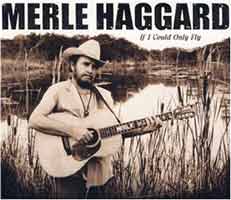 Was wû¥rde ich jemandem vorspielen, um ihm/ihr deutlich zu machen,
wie ein CountrysûÊnger heutzutage klingen sollte? Natû¥rlich
die neue Cash-Platte, eventuell "Teatro"
von Willie Nelson (wahrscheinlich aber nicht), aber auf jeden
Fall das neue Werk von Merle Haggard. Genauso wie Cash hat Haggard
Fans in der "jû¥ngeren Generation" und wird vom Nashville-Establishment
geschmûÊht: wûÊhrend Rick Rubin die Glanztaten von Johnny
Cash in den letzten Jahren produziert und verûÑffentlicht hat,
bringt jener seine Platten inzwischen bei Anti heraus, einem
Sublabel von Epitaph, das von Bad Religion-Gitarrist
Brett Gurewitz geleitet wird, und das auch die neue Heimat
von Tom Waits ist!
Was wû¥rde ich jemandem vorspielen, um ihm/ihr deutlich zu machen,
wie ein CountrysûÊnger heutzutage klingen sollte? Natû¥rlich
die neue Cash-Platte, eventuell "Teatro"
von Willie Nelson (wahrscheinlich aber nicht), aber auf jeden
Fall das neue Werk von Merle Haggard. Genauso wie Cash hat Haggard
Fans in der "jû¥ngeren Generation" und wird vom Nashville-Establishment
geschmûÊht: wûÊhrend Rick Rubin die Glanztaten von Johnny
Cash in den letzten Jahren produziert und verûÑffentlicht hat,
bringt jener seine Platten inzwischen bei Anti heraus, einem
Sublabel von Epitaph, das von Bad Religion-Gitarrist
Brett Gurewitz geleitet wird, und das auch die neue Heimat
von Tom Waits ist!

 Mehr ...
Mehr ...
| "Musikalisch war Haggard seit den Siebzigern nicht
mehr so superb. Aufs Wesentliche reduziert sind die Arrangements, passend
zu den sehnsuchtsvollen, sentimentalen, niemals aber schmachtenden Tunes.
Honky Tonk dominiert, doch `bareback´ ist Western Swing in Hank-Thompson-Tradition,
und jazzige Flexionen durchziehen das Album ebenso wie stilistische Remineszenzen
an Roy Acuff oder Lefty Frizzell. `He´s mellowed´, sagt Johnny
Cash über den Freund, `and yet he´s harder, if you can understand
that´. Können wir: Ol´ Hag is back." (Rolling Stone.
**** ½) |
|
| "Tom Waits hat einmal gesagt, er höre den Zug
in der Stimme Merle Haggards. Auf `If I Only Could Fly´ klingt endlich
auch wieder die Seele eines George Jones mit. Mehr kann man nicht verlangen."
(Spex) |
|
|
"At this point, Merle Haggard's musical territory
is staked out and grazed to the nubbin: slow, sauntering ballads, up-tempo
country boogie, occasionally a little Western swing. No string sections,
no synths, no exclamation marks. Staying clear of the clotted, market-tested
production of the Nashville A-team studio players seems to keep him alive;
still, his recent records, self-produced and made in his own California
studio, have been a bit plain, enshrining his time-ravaged voice with
a bit too much open, untreated space. If I Could Only Fly, his first for
the punk label Epitaph, is no different. But what a lyricist he still
can be. All the songs emanate from a single persona, an aging, cloistered
singer (Haggard is in his sixties) whose routine -- avoiding drugs, taking
comfort from cushioned bus seats, being honest with his kids -- is all
he has. In "Bareback," a song about surviving the road after
the romance of it goes away, he warns a woman that she'd better look out
for his comfort. But this isn't some male-chauvinist guffaw; it's about
age, not sex, and it's so unromantic that by its sheer honesty it achieves
tenderness. The album isn't quite Sinatra's September of My Years, but
the man's songwriting control is exemplary. There's nothing mytho-poetic
in boredom, and weariness is one of country's cliche themes, but Haggard
finds a middle road that's unusual for country: self-acceptance, totally
free of bluster or self-pity." (Rolling Stone US)
|
|
| The Be Good Tanyas: "Blue Horse" (Nettwerk, 2000) |
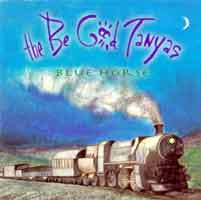 Neues kanadisches Damentrio mit einer Folkmusic, die entfernt an Gillian
Welch erinnert. Die Ladies schaffen es mit Gitarre und Banjo,
dass alte, eigentlich abgenudelte Lieder wie "Oh Susanna"
(kennt ihr alle: "I come from Alabama with the banjo on my knee...")
hier wirklich frisch klingen, wobei aber auch die eigenen Lieder gut
daherkommen. Auûerdem gibt's ab und zu E-Gitarre und "Cold Rain
and Snow" im Reggae-Rhythmus!
Neues kanadisches Damentrio mit einer Folkmusic, die entfernt an Gillian
Welch erinnert. Die Ladies schaffen es mit Gitarre und Banjo,
dass alte, eigentlich abgenudelte Lieder wie "Oh Susanna"
(kennt ihr alle: "I come from Alabama with the banjo on my knee...")
hier wirklich frisch klingen, wobei aber auch die eigenen Lieder gut
daherkommen. Auûerdem gibt's ab und zu E-Gitarre und "Cold Rain
and Snow" im Reggae-Rhythmus!

 Mehr ...
Mehr ...
|
"Das Debüt der drei kanadischen Grazien
wurde in diversen Zirkeln immer mal wieder positiv erwähnt, nun endlich
konnten auch wir unsere Zähne reinschlagen. Wären die Autos
auf dem Cover zirka 20 Jahre älter, wäre hier alles passgenau
für eine Harry Smith Compilation, oder eine Zusammenstellung von
Musik aus den Appalachen. Im Gillian Welch Dustbowl-Chic präsentieren
sich Frazey, Samantha und Trish, eine Fidel und ein Banjo
wie zufällig dabei, aber auch ein Schminkstift. Und ein Kleid, zwei
Nummern zu klein.
Aber wie bei Frau Welch ist das spätestens nach dem ersten Song über
jeden Bandwagon-Zweifel erhaben, so natürlich und von allen modernen
Einflüßen unbeleckt rollt das aus dem Boxen. Akustikgitarre,
Fiddle, Banjo, Mandoline, ganz sparsam gezupfter Bass und die Felle nur
kurz abgeschrubbt, alles kommt äußerst naturbelassen und klingt
nach (höchstens) dem zweiten Take. Zwei Mädels singen die erste
Stimme, Trish ist nur für den Background zuständig. Um sich
selbst kreiselt der Gesang, schöne und kräftige Stimmen, die
auch wenn sie mehrfach kommen, zuerst immer auf Emotion bedacht sind und
dann erst, dass alles auch gut zusammen passt. Es fällt mehr oder
weniger von allein in die richtigen Stellen.
Das erinnert von der Stimmung her an oben genannte Gillian
Welch, auch an frühe Freakwater, begeistert mit vielen eigenen Songs
und der Tatsache, dass sie gerade solchen alten Juwelen wie „Oh Susanna“
oder „The Coo Coo Bird“ neues Leben einhauchten (was ich nicht
mehr glauben mochte)." (Glitterhouse)
|
|
| Tim Finn, Bic Runga, Dave Dobbyn: "Together In Concert" (CRS, 2000) |
 NeuseelûÊndisches
Live-Gipfel-Treffen, mitgeschnitten bei einer gemeinsamen Tournee
im August/September 2000. Tim Finn braucht wohl nicht vorgestellt
werden (Split Enz, Crowded
House), Dave Dobbyn war mal Gitarrist bei Th'Dudes (von
denen ich zwei Platten aus den SpûÊt-70ern vom Wû¥hltisch
besitze!) und ist in Australien und Neuseeland ein Superstar. û¥ber
Bic Runga, der Dame in dem Trio, ist mir aber nichts bekannt.
3 Singer-Songwriter/innen als kongeniales Trio, mit dem nûÑtigen
Respekt vor dem Material der beiden anderen. Das alles wird in einer
schûÑnen elektrisch/akustischen Mischung vorgetragen, atmosphûÊrisch
relaxt, und wenn dann am Ende alle drei “Weather
With You” anstimmen, dann weiû man, was Pop-Musik im
eigentlichen Sinne bedeutet. NeuseelûÊndisches
Live-Gipfel-Treffen, mitgeschnitten bei einer gemeinsamen Tournee
im August/September 2000. Tim Finn braucht wohl nicht vorgestellt
werden (Split Enz, Crowded
House), Dave Dobbyn war mal Gitarrist bei Th'Dudes (von
denen ich zwei Platten aus den SpûÊt-70ern vom Wû¥hltisch
besitze!) und ist in Australien und Neuseeland ein Superstar. û¥ber
Bic Runga, der Dame in dem Trio, ist mir aber nichts bekannt.
3 Singer-Songwriter/innen als kongeniales Trio, mit dem nûÑtigen
Respekt vor dem Material der beiden anderen. Das alles wird in einer
schûÑnen elektrisch/akustischen Mischung vorgetragen, atmosphûÊrisch
relaxt, und wenn dann am Ende alle drei “Weather
With You” anstimmen, dann weiû man, was Pop-Musik im
eigentlichen Sinne bedeutet.
(22.04.02) |
| HGH: "Pignoise" (Stickman, 2000) |
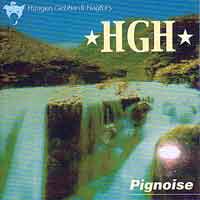 Das Album ist zwar nicht mehr ganz neu, aber ich habe es gerade erst
frisch erstanden (natû¥rlich wieder aus der Grabbelkiste!). Hier
macht doch tatsûÊchlich der Motorpsycho-Trommler auf dem Banjo
Bluegrass!
Das Album ist zwar nicht mehr ganz neu, aber ich habe es gerade erst
frisch erstanden (natû¥rlich wieder aus der Grabbelkiste!). Hier
macht doch tatsûÊchlich der Motorpsycho-Trommler auf dem Banjo
Bluegrass!
(30.06.2002)

 Mehr ...
Mehr ...
|
"HGH steht für Haugen, Gebhardt und Hagfors,
drei Norweger aus Bands wie Hellbillies, Motorpsycho und Home Groan (in
dieser Reihenfolge), die sich zur Aufnahme dieser 10 Songs und 34 Minuten
für zwei Tage in einer Berghütte eingeschlossen haben, um ihrer
Liebe zu Bluegrass und Country zu fröhnen. Ein Mikro haben sie aufgestellt,
sich drumrum gesetzt und ohne Drums und Overdubs aufgenommen.
Dabei sind alle drei erstklassige Instrumentalisten und wer Lars Haugen
hier auf unserem Orange Blossom Special an der elektrischen Gitarre gesehen
hat, der hat einen der besten norwegischen 6-Saiter bei der Arbeit beobachtet
(Haugen spielt auch in einem Septett namens Whipping Post, Norweger die
die klassischen Allman Brothers nachspielen, „nur besser“ wie
mir ein Allman-Fan versicherte).
Das Ergebnis ist ein recht abwechslungsreiches Album (alle drei schreiben
und singen), daß Einflüße von Westcoast-Folk, Mountain-Bluegrass,
an irische Weisen erinnernde Balladen und kleine humorige Einlagen (von
Motorpsycho´s Gebhart) gekonnt verbindet." (Glitterhouse)
|
|
| "Haugen, Gebhardt, Hagfors. Hauptberuflich Mitglieder
der Hellbellies, Motorpsycho, Home Groan. Spielen Banjo, Dobro, Mandoline,
Ukulele und die herzzerreißendste aller Tonquellen, die singende Säge.
Zu good-timey Downhome-Musik. Mit Hingabe und ebenso viel Humor. Glückliches
Norwegen, wo sich derlei Daffke-Bluegrass-Swing in nennenswerten Stückzahlen
verkauft und wo Midnight Choir und Madrugada die Charts anführen."
("Rolling Stone", D) |
|
| Hobotalk: "Beauty In Madness" (Virgin/Hut, 2000) |
|
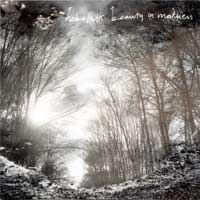 ... und wieder so eine wunderschûÑne Platte, die plûÑtzlich
auftaucht und leider viel zu schnell wieder aus der Aufmerksamkeit
verschwindet. Als ich sie kû¥rzlich beim BlûÊttern durch
mein CD-Regal mal wieder hervorgekramt habe, konnte ich mich auch
nicht mehr so genau erinnern, wie ich selber damals auf die Band
gekommen war. Wahrscheinlich û¥ber einen Glitterhouse-Tipp.
... und wieder so eine wunderschûÑne Platte, die plûÑtzlich
auftaucht und leider viel zu schnell wieder aus der Aufmerksamkeit
verschwindet. Als ich sie kû¥rzlich beim BlûÊttern durch
mein CD-Regal mal wieder hervorgekramt habe, konnte ich mich auch
nicht mehr so genau erinnern, wie ich selber damals auf die Band
gekommen war. Wahrscheinlich û¥ber einen Glitterhouse-Tipp.
Hinter "Hobotalk" verbirgt sich der schottische SûÊnger
und Songschreiber Marc Pilley mit drei weiteren Mitspielern
an Gitarre, Bass und Schlagwerk. Soweit also nichts besonders. Abgehangene,
melancholische Rock(?)-Musik, wie sie scheinbar nur in Schottland
entstehen kann. Keine Ahnung, was sich das Hut-Label (bzw.
Virgin bzw. Mutter EMI) bei der VerûÑffentlichung
damals gedacht bzw. erhofft haben. Vielleicht die Gewinne mit den
Labelmates von den Smashing Pumpkins ein wenig vor der Steuer
retten?
(25.03.2005)

 Mehr ...
Mehr ...
| Aus dem kleinen Dunbar an der Ostküset Schottlands
kommt das Quartett Hobotalk, dessen Wortführer, Sänger Marc Pilley
ein ausgezeichneter Songschreiber ist. Nach einer von der britischen Musikpresse
mit Begeisterung aufgenommenen 5-Track-EP im November 99, ist Beauty In
Madness das Debütalbum von Hobotalk Ein wenig folkangehaucht, country-
und bluesgetränkt entführt uns Pilley in elf Songs in seine Welt
der "Heartsongs For Good People", der "Herzsongs für
gute Menschen", so das Presseinfo seiner Plattenfirma. Von der Grundstimmung
her eher melancholisch stehen hier Liebesgeschichten -- glückliche
und unglückliche -- Stories aus seiner Heimat (einem kleinen Fischerdorf)
gegenüber.
Wo der sehr schöne Titelsong mit einem Harmonium aufwartet, singen
auf "Never Said When", die Mitglieder der Rockband Gomez im
Backing-Chor mit und kommt "I Wait For You" schön romantisch
daher. In der Single "I've Seen Some Things" geht es darum,
dass man einen Menschen nicht nach seinem Äußeren beurteilen
sollte und der Eröffnungstrack "Walks With Me" hält
die Lebensweisheit "There is nothing you can do about your past"
bereit. Wo Hobotalk gelegentlich an James Taylor erinnern, bringt die
Spex-Kritikerin auch noch John "Countryroads" Denver ins Spiel
-- da hat sie nicht ganz Unrecht.
(Thomas Bohnet, www.amazon.de)
|
|
|
Diese Scheibe ist ein wenig irreführend angelegt: Alles - der Bandname,
die wunderschönen Landschaftsaufnahmen auf dem Cover, das Booklet,
welches besagt, daß Frontmann Mark Pilley die Songs auf einem Harmonium
aus den 30er Jahren geschrieben hat, und auch die ersten Takte des Openeres
“Walks With Me” -, alles deutet auf eine solide Blues- oder
Folk-Scheibe hin, dann jedoch entwickelt sich aus den spartanischen Anfängen
ein unglaublich melancholisches Mainstream-Pop-Album. Das ist nicht unbedingt
schlecht, da mit Herz und Gefühl präsentiert, aber in bezug
auf das trügerische Marketing-Konzept eher verwirrend. Auf der Habenseite
zu verbuchen: eine angenehm relaxte Grundstimmung, solides, einfallsreich
arrangiertes Songwerk und diese soulige Leadstimme von Marc Pilley. Leider
trübt den Gesamteindruck die Tatsache, daß die Geschichte ohne
große Höhen und Tiefen dahinplätschert und frappant einen
bleibenden Eindruck vermissen läßt.
(Ullrich Maurer, www.intro.de)
|
|
|
The title of Hobotalk's first album is Beauty in Madness, but the title
is slightly misguiding. It could as well, or rather, have been self-titled,
since without being a concept album, it is a continuous story of wandering.
According to some interviews it is Marc Pilley's own, with the turning
point on the album represented by the song "Jackdaw." The album
is full of romanticized hobo life, starry skies, people unable to settle
down, and memories following them around on their trips. And since it
lacks a humoristic twist but relies on sentimental and emotional narration,
it could easily have become pathetic. But Marc Pilley manages to make
it sound genuinely honest without embarrassing listeners. At times the
songs even get intensely beautiful, like on "Never Said When,"
being grateful for the nights not being cold. The whole album goes in
a slow Neil Young-ish Harvest Moon tempo, with acoustic guitars, slow
organs, and sparse drums. An occasional foot stomping on wooden boards
and an occasional Dobro guitar give a country atmosphere, but the album
has more in common with the American singer/songwriter tradition. And
accordingly, Marc Pilley's voice and the stories he tells are the main
attractions here, even though the other instruments are often delicately
arranged.
(by Lars Lovén, All
Music Guide)
|
|
| Ida: "Will You Find Me" (Tiger Style, 2000) |
 Ein weiteres wunderbares Album dieser wunderbaren Band, die ich erst
vor kurzem fû¥r mich entdeckt habe. "Will You Find Me" ist
nach drei Alben beim kleinen Indielabel Secret Machines das
erste, das eigentlich beim Majorlabel Capitol herauskommen
sollte, woraus aber nichts wurde.
Ein weiteres wunderbares Album dieser wunderbaren Band, die ich erst
vor kurzem fû¥r mich entdeckt habe. "Will You Find Me" ist
nach drei Alben beim kleinen Indielabel Secret Machines das
erste, das eigentlich beim Majorlabel Capitol herauskommen
sollte, woraus aber nichts wurde.
(28.01.2009)

 Mehr ...
Mehr ...
Seit `92 ist dieses gemischte Quartett (2 boys, 2 girls) schon aktiv und hat drei wundervolle Alben auf dem leider eingestellten Simple Machines Label ver—ffentlicht. Aus irgendwelchen Gr■nden fand Capitol Interesse an der Band (musikalische Klasse kann es nicht gewesen sein, denn danach suchen die nicht) und mit Unterst■tzung von Warn Defever (His Name Is Alive), Bernie Worrell (P-Funk), Tara Jane O'Neil und Cynthia Nelson (beide Retsin) und einigen anderen wurde dieses Album im Mai `99 fertiggestellt. Das groÔe Budget h—rt man dieser Platte an, aber das Geld war gut angelegt, denn Will You Find Me klingt warm und bet—rend.
Natürlich bekam Capitol kalte F■Ôe. Ich kann mir auch nicht vorstellen, was sie mit diesem Album hðtten anfangen wollen, aber die Frage sei gestattet: warum haben sie die Band ■berhaupt unter Vertrag genommen? So dauerte es ■ber ein Jahr, bis die 14 Songs (57 Min.) endlich auf Tiger Style, einem New Yorker Indie ver—ffentlicht werden konnten.
Mit Karla Schickele, Daniel Littleton und Elizabeth Mitchell verf■gt die Band gleich ■ber drei Songwriter und Sðnger, die das Material sehr verhalten angehen. Sanft werden Gitarren-Akkorde geschlagen, Pianomelodien schweben ein, Schlagzeug und Bass sind durchweg underplayed und verstehen sich keinesfalls als Rhythmusgruppe. Melodica, Akkordeon, Cello, Viola und Orgel f■gen sich in das Soundambiente ein und Instrumente wie Plastikschlauch, Weinglas (drei Nennungen) und ein Paket Salz machen diese einzigartig elegisch-sanfte Kammermusik zu einem echten Erlebnis.
Die CD kommt im Digipak mit dickem Booklet, sch—nen Fotos und allen Texten.
(Glitterhouse)
It's the quiet ones to keep an eye on, the saying goes. New York City slow-core outfit Ida is a strong case in point. The band's enchanting, minimalist pop songs have, in the past, caught the attention of the likes of ex-Tsunami frontwoman Jenny Toomey, who subsequently released three Ida records on her defunct Simple Machines imprint. Will You Find Me, which was originally recorded for release on Capitol Records, is the charming quartet's fourth long-player and a truly memorable collection of delicate songs uniformly showered in rays of gorgeous instrumentation and melody. On tracks such as "Maybelle," fragile guitars and placid percussion cascade into a tranquil pool with faintly elancholic, yet heartwarming reflections. But it's the haunting vocal armonies of singers/guitarists Daniel Littleton and Elizabeth Mtchell, as well as those of bassist Karla Schickele, that truly ropel Find Me into soft pop heaven, a state of grace that is specially apparent on the gently penetrating opener, "Down On Your Back," and the sorrowful-yet-sweet "This Water." Musical contributions by Tara Jane O'Neil (Retsin), Warren Defever (His Name Is Alive), Bernie Worrell (P-Funk) and others help make Will You Find Me the most arresting Ida effort to date.
(Billboard)
Taking cues from the spartan arrangements of slo-core indie pop maestros Low, Ida crafts gentle, soothing pop music, heartfelt and vulnerable, yet warm as a lazy summer draft.
"Will You Find Me" was originally slated for release on Capitol, but, as is the case with many bands signed during the major-label restructuring of early 1999, Ida soon found itself in limbo, unable to release a record, yet still under contract with Capitol. The band eventually found an out to release this set, with another completed album purportedly still in reserve, on small NYC-based indie Tiger Style.
Led by the newlywed couple of Daniel Littleton and Carla Mitchell, the group lulls the listener into tranquility with lush harmonies courtesy of the pair plus bassist Karla Schickele. Spare arrangements of guitar, piano, and quiet percussion leave the listener glazed in a cocoon of contentment, melodies speaking both to the senses and to the soul.
Then, just when the listener drifts seemingly past the point of no return, Ida introduces an atmospheric twist, be it invigorated percussion from the now-departed Michael Littleton, brother of Daniel, or the flourishes of harmonica, piano, and Wurlitzer that provide a welcome flavor tart to the discerning ear.
With strong tracks by the emerging Schickele (the piano-driven "Man In Mind" stands out) breaking up the occasional monotony of the Littleton/Mitchell duo, "Will You Find Me" has the potential to reach an audience wider than the devout indie-rock fan base the band has thus far built. The Capitol fiasco, however, seems to have curbed some of Ida's commercial momentum, if not the spirit of authenticity in their sparkling brand of music.
(CMJ)
|
| Man: "Endangered Species" (Evangeline, 2000) |
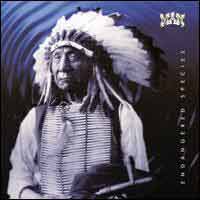 Man
gehûÑren zu meinen alten Helden. Live sind sie auch immer noch
spitze, aber von einem Studioalbum mit neuem Songmaterial erwartete
ich eigentlich nichts, bin dann aber doch angenehm û¥berrascht
worden! Micky Jones, Deke Leonard, Martin Ace
und der noch relativ junge Trommler Bob Richards waren mit
dem nach mehr als 20jûÊhriger Unterbrechung zur Band zurû¥ckgekehrten
Keyboarder Phil Ryan (spielte 72/73 auf den Glanzlichtern in
der langen Bandkarriere: "Be
Good To Yourself ..." und "Back
Into The Future" und dann 1976 auf dem letzten Album vor
der langen Pause "Welsh Connection")
im Studio. Es scheint so, dass diesmal wieder mehr Zeit und Geld in
die Produktion gesteckt werden konnte: man war wieder wie in den frû¥hen
70ern in den legendûÊren Waliser Rockfield Studios und
an den Reglern saû Dave Charles, ehemaliger Help
Yourself-Drummer und Dave Edmunds-Sidekick, inzwischen aber ein
anerkannter Toningenieur und Produzent. Man
gehûÑren zu meinen alten Helden. Live sind sie auch immer noch
spitze, aber von einem Studioalbum mit neuem Songmaterial erwartete
ich eigentlich nichts, bin dann aber doch angenehm û¥berrascht
worden! Micky Jones, Deke Leonard, Martin Ace
und der noch relativ junge Trommler Bob Richards waren mit
dem nach mehr als 20jûÊhriger Unterbrechung zur Band zurû¥ckgekehrten
Keyboarder Phil Ryan (spielte 72/73 auf den Glanzlichtern in
der langen Bandkarriere: "Be
Good To Yourself ..." und "Back
Into The Future" und dann 1976 auf dem letzten Album vor
der langen Pause "Welsh Connection")
im Studio. Es scheint so, dass diesmal wieder mehr Zeit und Geld in
die Produktion gesteckt werden konnte: man war wieder wie in den frû¥hen
70ern in den legendûÊren Waliser Rockfield Studios und
an den Reglern saû Dave Charles, ehemaliger Help
Yourself-Drummer und Dave Edmunds-Sidekick, inzwischen aber ein
anerkannter Toningenieur und Produzent. |
| Nickel Creek: "Nickel Creek" (Sugar Hill, 2000) |
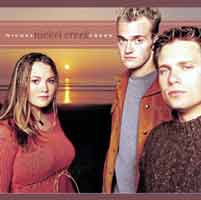 Chris Thile (Mandoline), Sara Watkins (Geige) und Sean
Watkins (Gitarre) sind noch sehr jung (20-24 Jahre), aber schon
alte Hasen im Bluegrass-GeschûÊft (die Band Nickel Creek existiert
schon ca. 10 Jahre!). Gerade Chris Thile gilt bereits als einer der
angesagtesten Mandolinenspieler des Landes. Im zarten Alter von 13
Jahren hat er auf Sugar Hill bereits eine ziemlich gute Soloplatte
hingelegt. Auf der neuen Dolly Parton Platte "Little
Sparrow" ist er ebenfalls dabei. Produziert wurde das neue
Werk von Alison Krauss.
Chris Thile (Mandoline), Sara Watkins (Geige) und Sean
Watkins (Gitarre) sind noch sehr jung (20-24 Jahre), aber schon
alte Hasen im Bluegrass-GeschûÊft (die Band Nickel Creek existiert
schon ca. 10 Jahre!). Gerade Chris Thile gilt bereits als einer der
angesagtesten Mandolinenspieler des Landes. Im zarten Alter von 13
Jahren hat er auf Sugar Hill bereits eine ziemlich gute Soloplatte
hingelegt. Auf der neuen Dolly Parton Platte "Little
Sparrow" ist er ebenfalls dabei. Produziert wurde das neue
Werk von Alison Krauss.
|
 die
Besten
die
Besten Das Solodebû¥t des ehemaligen Whiskeytown-Masterminds.
Erstklassiges Songwriting, die richtigen musikalischen Begleiter:
Gillian Welch und deren Partner
David Rawlings. Am wichtigsten aber ist Ethan Johns,
Sohn der Produzentenlegende Glyn Johns, hier fû¥r Produktion,
Tontechnik, Schlagzeug, Bass und Keyboards zustûÊndig! Neben den
Stimmen von Adams und Welch hûÑren wir auch noch in Kurzauftritten
die gûÑttliche Emmylou Harris und erstmals mit meiner Aufmerksamkeit
Kim Richey.
Das Solodebû¥t des ehemaligen Whiskeytown-Masterminds.
Erstklassiges Songwriting, die richtigen musikalischen Begleiter:
Gillian Welch und deren Partner
David Rawlings. Am wichtigsten aber ist Ethan Johns,
Sohn der Produzentenlegende Glyn Johns, hier fû¥r Produktion,
Tontechnik, Schlagzeug, Bass und Keyboards zustûÊndig! Neben den
Stimmen von Adams und Welch hûÑren wir auch noch in Kurzauftritten
die gûÑttliche Emmylou Harris und erstmals mit meiner Aufmerksamkeit
Kim Richey.
 Mehr ...
Mehr ...
 Das Album meiner Namensvetterin (sagt man/frau das so? oder Namenscousine?)
erschien erst mit VerspûÊtung, ist nach meinem Kenntnisstand bereits
1999 aufgenommen und wie Sauerbrot den groûen Companies angeboten
und abgelehnt worden. Auf ihrem eigenen Ego-Label verûÑffentlicht
und von Richard Bransons neuestem Plattenlabel (V2=Virgin 2!) vertrieben
gibt es ein Meisterwerk zu hûÑren!
Das Album meiner Namensvetterin (sagt man/frau das so? oder Namenscousine?)
erschien erst mit VerspûÊtung, ist nach meinem Kenntnisstand bereits
1999 aufgenommen und wie Sauerbrot den groûen Companies angeboten
und abgelehnt worden. Auf ihrem eigenen Ego-Label verûÑffentlicht
und von Richard Bransons neuestem Plattenlabel (V2=Virgin 2!) vertrieben
gibt es ein Meisterwerk zu hûÑren!
 Mehr ...
Mehr ...

 Mehr ...
Mehr ...
 "Well, I won't back down" - schon gleich zu Beginn stellt
Johnny Cash klar, worum es geht. Der Mann geht nicht nur nicht unter,
sondern setzt mit jedem dazu gewonnenen Jahresring zu neuen Quantensprû¥ngen
an. Beim Opener handelt es sich um einen von Tom Petty fû¥r
sein Soloalbum "Full Moon Fever" geschriebenen Song, in
dem Johnny Cash das Kunstwerk gelingt, sowohl archetypisch Cash-like
als auch archetypisch Petty-like zu klingen. Die Auswahl der folgenden
Coverversionen ist einfach umwerfend: Neil Diamonds "Solitary
Man" gepaart mit U2's "One" (zuvor undenkbar,
was aus diesem Song rauszuholen ist), Will Oldham's abgrû¥ndigem
"I See A Darkness" und - um den ganzen die Krone aufzusetzen
- Nick Cave's "The Mercy Seat", dargeboten in einer
Art und Weise, die selbst Caves sagenhaftes Original vergleichsweise,
um es in der Fuûballersprache zu sagen, "û¥bermotiviert"
aussehen lûÊût. Cash nûÊmlich vertraut unter der Obhut von Rick
Rubin und zum krûÑnenden Abschluss seiner "American Recordings"-Trilogie
wieder ganz der Aura seiner rudimentûÊren Arrangements, die die
Essenz solcher Klassesongs erst wahrhaft entfalten, sowie der AutoritûÊt
seiner Stimme, die - traurig, aber wahr - wiewohl krankheitsbedingt
gezeichnet, noch eindrucksvoller die Allmacht und IntegritûÊt
des Meisters unter Beweis stellt. Gastauftritte gibt's û¥berdies
von Petty bis Oldham themselves und es ist wohl û¥berflû¥ssig
zu sagen, dass sich die zweite PlattenhûÊlfte mit eigenen Kompositionen
bestens in den zuvor gefertigten Rahmen fû¥gt. Ausnahmeaufnahme
eines Ausnahmekû¥nstlers!
"Well, I won't back down" - schon gleich zu Beginn stellt
Johnny Cash klar, worum es geht. Der Mann geht nicht nur nicht unter,
sondern setzt mit jedem dazu gewonnenen Jahresring zu neuen Quantensprû¥ngen
an. Beim Opener handelt es sich um einen von Tom Petty fû¥r
sein Soloalbum "Full Moon Fever" geschriebenen Song, in
dem Johnny Cash das Kunstwerk gelingt, sowohl archetypisch Cash-like
als auch archetypisch Petty-like zu klingen. Die Auswahl der folgenden
Coverversionen ist einfach umwerfend: Neil Diamonds "Solitary
Man" gepaart mit U2's "One" (zuvor undenkbar,
was aus diesem Song rauszuholen ist), Will Oldham's abgrû¥ndigem
"I See A Darkness" und - um den ganzen die Krone aufzusetzen
- Nick Cave's "The Mercy Seat", dargeboten in einer
Art und Weise, die selbst Caves sagenhaftes Original vergleichsweise,
um es in der Fuûballersprache zu sagen, "û¥bermotiviert"
aussehen lûÊût. Cash nûÊmlich vertraut unter der Obhut von Rick
Rubin und zum krûÑnenden Abschluss seiner "American Recordings"-Trilogie
wieder ganz der Aura seiner rudimentûÊren Arrangements, die die
Essenz solcher Klassesongs erst wahrhaft entfalten, sowie der AutoritûÊt
seiner Stimme, die - traurig, aber wahr - wiewohl krankheitsbedingt
gezeichnet, noch eindrucksvoller die Allmacht und IntegritûÊt
des Meisters unter Beweis stellt. Gastauftritte gibt's û¥berdies
von Petty bis Oldham themselves und es ist wohl û¥berflû¥ssig
zu sagen, dass sich die zweite PlattenhûÊlfte mit eigenen Kompositionen
bestens in den zuvor gefertigten Rahmen fû¥gt. Ausnahmeaufnahme
eines Ausnahmekû¥nstlers!
 Mehr ...
Mehr ...
 Bereits die zweite gute Slow River-VerûÑffentlichung, die innerhalb
kurzer Zeit den Weg auf diese Seite gefunden hat! Die CD habe ich
gestern aus einer Grabbelkiste gezogen, der Name des Kû¥nstlers
war mir irgendwie schon mal untergekommen, wahrscheinlich auf den
Glitterhouseseiten. Und - Volltreffer! Nicht Rock, nicht Country,
auch nicht "Americana", einfach nur wunderbare, altmodische
Songs mit viel Gitarre, Cello, Vibraphon, Trompete, E-Piano, etc.
Bereits die zweite gute Slow River-VerûÑffentlichung, die innerhalb
kurzer Zeit den Weg auf diese Seite gefunden hat! Die CD habe ich
gestern aus einer Grabbelkiste gezogen, der Name des Kû¥nstlers
war mir irgendwie schon mal untergekommen, wahrscheinlich auf den
Glitterhouseseiten. Und - Volltreffer! Nicht Rock, nicht Country,
auch nicht "Americana", einfach nur wunderbare, altmodische
Songs mit viel Gitarre, Cello, Vibraphon, Trompete, E-Piano, etc. Mehr ...
Mehr ...
 In ihrem eigenen Studio eingespielt und produziert von Victoria und
J.C. Hopkins. Mitgewirkt haben u.a. Gatte Mark Olson,
Greg Leisz (Pedal steel), die Schlagzeuger Don Heffington,
Danny Frankel und John Convertino, Bassist David
Piltch und Geigerin Petra Haden (Tochter von Charlie Haden).
Van Dyke Parks steuert wunderbare Streicherarrangements bei.
Der Titelsong stammt von Bossanova-û¥bervater Antonio Carlos
Jobim und ist als Wahl sicherlich nicht offensichtlich (Frau Williams
mit ihrer "Piepsstimme" wagt sich an Bossa Nova?), funktioniert
aber ganz wunderbar. Victoria Williams schafft den Spagat zwischen
den scheinbar unvertrûÊglichen Genres Alternative-Rock und Broadway-Melodien.
In ihrem eigenen Studio eingespielt und produziert von Victoria und
J.C. Hopkins. Mitgewirkt haben u.a. Gatte Mark Olson,
Greg Leisz (Pedal steel), die Schlagzeuger Don Heffington,
Danny Frankel und John Convertino, Bassist David
Piltch und Geigerin Petra Haden (Tochter von Charlie Haden).
Van Dyke Parks steuert wunderbare Streicherarrangements bei.
Der Titelsong stammt von Bossanova-û¥bervater Antonio Carlos
Jobim und ist als Wahl sicherlich nicht offensichtlich (Frau Williams
mit ihrer "Piepsstimme" wagt sich an Bossa Nova?), funktioniert
aber ganz wunderbar. Victoria Williams schafft den Spagat zwischen
den scheinbar unvertrûÊglichen Genres Alternative-Rock und Broadway-Melodien.
 Mehr ...
Mehr ...
 Spartanisches SpûÊtwerk eines der besten amerikanischen Singer/Songwriter!
Spartanisches SpûÊtwerk eines der besten amerikanischen Singer/Songwriter!
 Mehr ...
Mehr ...
 Diese ausgezeichnete Album hûÊtte ich fast vergessen! Erst durch die
dazu gehûÑrenden 1o"-EPs "The
Other Fool" und "Walking
With J" bin ich wieder darauf gekommen!
Diese ausgezeichnete Album hûÊtte ich fast vergessen! Erst durch die
dazu gehûÑrenden 1o"-EPs "The
Other Fool" und "Walking
With J" bin ich wieder darauf gekommen! Mehr ...
Mehr ...

 Mehr ...
Mehr ...
 Jim Scott als Produzent, in der Begleitband L.A. Studiocracks
wie Pedalsteel-Meister Greg Leisz, Bassist Bob Glaub,
Trommler Don Heffington und John Ginty an den Keyboards.
Keine Ahnung, wie Glitterhouse sowas finanziert. Es gab zwar euphorische
Rezensionen, aber sicherlich keinen Verkaufserfolg. Und auch an mir
ging die Platte damals spurlos vorbei. Erst neulich, bei der Glitterhouse-Resteverwertung
habe ich zugegriffen und muss feststellen: eine wunderschûÑne
Platte, zu gut fû¥r diese Zeiten!
Jim Scott als Produzent, in der Begleitband L.A. Studiocracks
wie Pedalsteel-Meister Greg Leisz, Bassist Bob Glaub,
Trommler Don Heffington und John Ginty an den Keyboards.
Keine Ahnung, wie Glitterhouse sowas finanziert. Es gab zwar euphorische
Rezensionen, aber sicherlich keinen Verkaufserfolg. Und auch an mir
ging die Platte damals spurlos vorbei. Erst neulich, bei der Glitterhouse-Resteverwertung
habe ich zugegriffen und muss feststellen: eine wunderschûÑne
Platte, zu gut fû¥r diese Zeiten! Mehr ...
Mehr ...
 Mehr ...
Mehr ...
 "Patti
Smith is back with a bang. Backed by a band with old and new members,
she sings songs of things old and new. The title and the cover is
referring back to WWII and the war in Vietnam. In a way she takes
off from just about where The Fugs left it with Tenderness Junction
in 1968. Out demons out! Through the years, Patti's voice has been
a powerful, convincing wail as well as a catatonic drone. This time
around she's mostly in good spirits. Great band, great production,
some really great songs. I believe she's quite pleased. So am I."
"Patti
Smith is back with a bang. Backed by a band with old and new members,
she sings songs of things old and new. The title and the cover is
referring back to WWII and the war in Vietnam. In a way she takes
off from just about where The Fugs left it with Tenderness Junction
in 1968. Out demons out! Through the years, Patti's voice has been
a powerful, convincing wail as well as a catatonic drone. This time
around she's mostly in good spirits. Great band, great production,
some really great songs. I believe she's quite pleased. So am I."

 Mehr ...
Mehr ...

 Mehr ...
Mehr ...
 Americana aus Stuttgart! Eine tolle Band, von der man kaum was mitbekommt
und die schon mehrere vorzû¥gliche Alben verûÑffentlich hat!
Americana aus Stuttgart! Eine tolle Band, von der man kaum was mitbekommt
und die schon mehrere vorzû¥gliche Alben verûÑffentlich hat! Mehr ...
Mehr ...
 Noch mehr gute Musik aus Nû¥rnberg! Hier das Debû¥talbum der
Band, das ich mir endlich gegûÑnnt habe. Slow-Motion-Folk
mit E-Gitarren und alten analogen Keyboards, damals noch pur und weitestgehend
ohne Absicherung durch Rhythmusinstrumente. Trotzdem ist das typische
Missouri-Musik. Selten habe ich so schûÑne Musik gehûÑrt,
die fast still steht, ohne auch nur einen Moment langweilig zu sein.
Hoffenlich gibt's da bald mal was Neues, denn von Gitarrist Frank
Mollena und Keyboarder Christian Ebert waren zuletzt zu
hûÑren und zu sehen mit der Band Green
Apple Sea, die ja inzwischen auch als "Bayrische Band"
gilt, wie ich bei einem Interview mit deren SûÊnger Stefan
Prange auf Youtube erfahren durfte, der ja eigentlich aus dem
Emsland stammt, die Band jahrelang von Mû¥nster
aus betrieb und inszwischen in der frankischen Metropole
lebt. Aber deshalb gleich als adoptierte BAYERN?
Noch mehr gute Musik aus Nû¥rnberg! Hier das Debû¥talbum der
Band, das ich mir endlich gegûÑnnt habe. Slow-Motion-Folk
mit E-Gitarren und alten analogen Keyboards, damals noch pur und weitestgehend
ohne Absicherung durch Rhythmusinstrumente. Trotzdem ist das typische
Missouri-Musik. Selten habe ich so schûÑne Musik gehûÑrt,
die fast still steht, ohne auch nur einen Moment langweilig zu sein.
Hoffenlich gibt's da bald mal was Neues, denn von Gitarrist Frank
Mollena und Keyboarder Christian Ebert waren zuletzt zu
hûÑren und zu sehen mit der Band Green
Apple Sea, die ja inzwischen auch als "Bayrische Band"
gilt, wie ich bei einem Interview mit deren SûÊnger Stefan
Prange auf Youtube erfahren durfte, der ja eigentlich aus dem
Emsland stammt, die Band jahrelang von Mû¥nster
aus betrieb und inszwischen in der frankischen Metropole
lebt. Aber deshalb gleich als adoptierte BAYERN? Mehr ...
Mehr ...

 Mehr ...
Mehr ...
 Im Trio mit Bassist Davey Faragher (Cracker) und SaitenvielkûÑnner
David Immerglû¥ck (Counting Crows), ganz ohne Trommler
und weitestgehend akustisch eingespieltes SpûÊtwerk eines der
besten amerikanischen Songschreibers mit starken Folk- und Bluesakzenten.
Im Trio mit Bassist Davey Faragher (Cracker) und SaitenvielkûÑnner
David Immerglû¥ck (Counting Crows), ganz ohne Trommler
und weitestgehend akustisch eingespieltes SpûÊtwerk eines der
besten amerikanischen Songschreibers mit starken Folk- und Bluesakzenten.
 Mehr ...
Mehr ...
 Bob
Weir's erstes Nicht-Grateful Dead Studio Album seit Mitte der 80er.
Ratdog entstand als Duo-Projekt mit Kontrabassist Rob Wasserman.
Inzwischen zur echten Band geworden gehûÑren zur festen Besetzung
neben den beiden noch Jay Lane (dr), Jeff Chimenti (keyb)
und Mark Karan (g). Als GûÊste sind u.a. Ex-Dead-Kollege
Mickey Hart, Ex-Kingfish-Kollege
Matt Kelly (harp) und Saxophonist Dave Ellis dabei.
Bob
Weir's erstes Nicht-Grateful Dead Studio Album seit Mitte der 80er.
Ratdog entstand als Duo-Projekt mit Kontrabassist Rob Wasserman.
Inzwischen zur echten Band geworden gehûÑren zur festen Besetzung
neben den beiden noch Jay Lane (dr), Jeff Chimenti (keyb)
und Mark Karan (g). Als GûÊste sind u.a. Ex-Dead-Kollege
Mickey Hart, Ex-Kingfish-Kollege
Matt Kelly (harp) und Saxophonist Dave Ellis dabei.
 Entwarnung!
Dieses Album ist zwar auf dem "Esotherik-Jazz-Label" ECM
erschienen, aber unser lang verschollener alter Held und HûÊlfte
des ebenfalls lang vergangenen Kultduos The
Incredible String Band singt hier - vielleicht nicht mehr ganz
so vital wie vor 30 Jahren - aber immer noch sehr spannend!
Entwarnung!
Dieses Album ist zwar auf dem "Esotherik-Jazz-Label" ECM
erschienen, aber unser lang verschollener alter Held und HûÊlfte
des ebenfalls lang vergangenen Kultduos The
Incredible String Band singt hier - vielleicht nicht mehr ganz
so vital wie vor 30 Jahren - aber immer noch sehr spannend!  Irgendwann im Frû¥hjahr hatte ich "Horses In The Sky"
, eine der letzten, mir noch fehlenden Platten von The Silver Mt.
Zion, meiner neuen kanadischen Lieblinxband, bestellt - zusammen
mit einem ersten Versuch bei Godspeed You Black Emperor!, der
VorlûÊufer- bzw. Parallelband von Efrim Menuck, Thierry
Amary und Sophie Trudeau. "Lift Your Skinny Fists
..." liegt "historisch" zwischen den ersten beiden
Alben von Silver Mt. Zion ("He Has
Left Us Alone But Shafts Of Light Sometimes Grace The Corner..."
und "Born Into Trouble As The
Sparks Fly Upward"), bevor die Band 2003 auf Eis gelegt wurde.
Diese Pause endet û¥brigenz im Dezember 2010 mit einer Europatournee,
die aber leider nicht in meine NûÊhe fû¥hrt und angeblich
schon lûÊngst ausverkauft ist. So was nennt man wohl einen kultigen
Geheimtipp.
Irgendwann im Frû¥hjahr hatte ich "Horses In The Sky"
, eine der letzten, mir noch fehlenden Platten von The Silver Mt.
Zion, meiner neuen kanadischen Lieblinxband, bestellt - zusammen
mit einem ersten Versuch bei Godspeed You Black Emperor!, der
VorlûÊufer- bzw. Parallelband von Efrim Menuck, Thierry
Amary und Sophie Trudeau. "Lift Your Skinny Fists
..." liegt "historisch" zwischen den ersten beiden
Alben von Silver Mt. Zion ("He Has
Left Us Alone But Shafts Of Light Sometimes Grace The Corner..."
und "Born Into Trouble As The
Sparks Fly Upward"), bevor die Band 2003 auf Eis gelegt wurde.
Diese Pause endet û¥brigenz im Dezember 2010 mit einer Europatournee,
die aber leider nicht in meine NûÊhe fû¥hrt und angeblich
schon lûÊngst ausverkauft ist. So was nennt man wohl einen kultigen
Geheimtipp. Mehr ...
Mehr ...
 Was wû¥rde ich jemandem vorspielen, um ihm/ihr deutlich zu machen,
wie ein CountrysûÊnger heutzutage klingen sollte? Natû¥rlich
die neue Cash-Platte, eventuell "Teatro"
von Willie Nelson (wahrscheinlich aber nicht), aber auf jeden
Fall das neue Werk von Merle Haggard. Genauso wie Cash hat Haggard
Fans in der "jû¥ngeren Generation" und wird vom Nashville-Establishment
geschmûÊht: wûÊhrend Rick Rubin die Glanztaten von Johnny
Cash in den letzten Jahren produziert und verûÑffentlicht hat,
bringt jener seine Platten inzwischen bei Anti heraus, einem
Sublabel von Epitaph, das von Bad Religion-Gitarrist
Brett Gurewitz geleitet wird, und das auch die neue Heimat
von Tom Waits ist!
Was wû¥rde ich jemandem vorspielen, um ihm/ihr deutlich zu machen,
wie ein CountrysûÊnger heutzutage klingen sollte? Natû¥rlich
die neue Cash-Platte, eventuell "Teatro"
von Willie Nelson (wahrscheinlich aber nicht), aber auf jeden
Fall das neue Werk von Merle Haggard. Genauso wie Cash hat Haggard
Fans in der "jû¥ngeren Generation" und wird vom Nashville-Establishment
geschmûÊht: wûÊhrend Rick Rubin die Glanztaten von Johnny
Cash in den letzten Jahren produziert und verûÑffentlicht hat,
bringt jener seine Platten inzwischen bei Anti heraus, einem
Sublabel von Epitaph, das von Bad Religion-Gitarrist
Brett Gurewitz geleitet wird, und das auch die neue Heimat
von Tom Waits ist!
 Mehr ...
Mehr ...
 Neues kanadisches Damentrio mit einer Folkmusic, die entfernt an Gillian
Welch erinnert. Die Ladies schaffen es mit Gitarre und Banjo,
dass alte, eigentlich abgenudelte Lieder wie "Oh Susanna"
(kennt ihr alle: "I come from Alabama with the banjo on my knee...")
hier wirklich frisch klingen, wobei aber auch die eigenen Lieder gut
daherkommen. Auûerdem gibt's ab und zu E-Gitarre und "Cold Rain
and Snow" im Reggae-Rhythmus!
Neues kanadisches Damentrio mit einer Folkmusic, die entfernt an Gillian
Welch erinnert. Die Ladies schaffen es mit Gitarre und Banjo,
dass alte, eigentlich abgenudelte Lieder wie "Oh Susanna"
(kennt ihr alle: "I come from Alabama with the banjo on my knee...")
hier wirklich frisch klingen, wobei aber auch die eigenen Lieder gut
daherkommen. Auûerdem gibt's ab und zu E-Gitarre und "Cold Rain
and Snow" im Reggae-Rhythmus!
 Mehr ...
Mehr ...
 NeuseelûÊndisches
Live-Gipfel-Treffen, mitgeschnitten bei einer gemeinsamen Tournee
im August/September 2000. Tim Finn braucht wohl nicht vorgestellt
werden (Split Enz, Crowded
House), Dave Dobbyn war mal Gitarrist bei Th'Dudes (von
denen ich zwei Platten aus den SpûÊt-70ern vom Wû¥hltisch
besitze!) und ist in Australien und Neuseeland ein Superstar. û¥ber
Bic Runga, der Dame in dem Trio, ist mir aber nichts bekannt.
3 Singer-Songwriter/innen als kongeniales Trio, mit dem nûÑtigen
Respekt vor dem Material der beiden anderen. Das alles wird in einer
schûÑnen elektrisch/akustischen Mischung vorgetragen, atmosphûÊrisch
relaxt, und wenn dann am Ende alle drei “Weather
With You” anstimmen, dann weiû man, was Pop-Musik im
eigentlichen Sinne bedeutet.
NeuseelûÊndisches
Live-Gipfel-Treffen, mitgeschnitten bei einer gemeinsamen Tournee
im August/September 2000. Tim Finn braucht wohl nicht vorgestellt
werden (Split Enz, Crowded
House), Dave Dobbyn war mal Gitarrist bei Th'Dudes (von
denen ich zwei Platten aus den SpûÊt-70ern vom Wû¥hltisch
besitze!) und ist in Australien und Neuseeland ein Superstar. û¥ber
Bic Runga, der Dame in dem Trio, ist mir aber nichts bekannt.
3 Singer-Songwriter/innen als kongeniales Trio, mit dem nûÑtigen
Respekt vor dem Material der beiden anderen. Das alles wird in einer
schûÑnen elektrisch/akustischen Mischung vorgetragen, atmosphûÊrisch
relaxt, und wenn dann am Ende alle drei “Weather
With You” anstimmen, dann weiû man, was Pop-Musik im
eigentlichen Sinne bedeutet. Das Album ist zwar nicht mehr ganz neu, aber ich habe es gerade erst
frisch erstanden (natû¥rlich wieder aus der Grabbelkiste!). Hier
macht doch tatsûÊchlich der Motorpsycho-Trommler auf dem Banjo
Bluegrass!
Das Album ist zwar nicht mehr ganz neu, aber ich habe es gerade erst
frisch erstanden (natû¥rlich wieder aus der Grabbelkiste!). Hier
macht doch tatsûÊchlich der Motorpsycho-Trommler auf dem Banjo
Bluegrass! Mehr ...
Mehr ...
 Mehr ...
Mehr ...
 Ein weiteres wunderbares Album dieser wunderbaren Band, die ich erst
vor kurzem fû¥r mich entdeckt habe. "Will You Find Me" ist
nach drei Alben beim kleinen Indielabel Secret Machines das
erste, das eigentlich beim Majorlabel Capitol herauskommen
sollte, woraus aber nichts wurde.
Ein weiteres wunderbares Album dieser wunderbaren Band, die ich erst
vor kurzem fû¥r mich entdeckt habe. "Will You Find Me" ist
nach drei Alben beim kleinen Indielabel Secret Machines das
erste, das eigentlich beim Majorlabel Capitol herauskommen
sollte, woraus aber nichts wurde.
 Mehr ...
Mehr ...
 Man
gehûÑren zu meinen alten Helden. Live sind sie auch immer noch
spitze, aber von einem Studioalbum mit neuem Songmaterial erwartete
ich eigentlich nichts, bin dann aber doch angenehm û¥berrascht
worden! Micky Jones, Deke Leonard, Martin Ace
und der noch relativ junge Trommler Bob Richards waren mit
dem nach mehr als 20jûÊhriger Unterbrechung zur Band zurû¥ckgekehrten
Keyboarder Phil Ryan (spielte 72/73 auf den Glanzlichtern in
der langen Bandkarriere: "Be
Good To Yourself ..." und "Back
Into The Future" und dann 1976 auf dem letzten Album vor
der langen Pause "Welsh Connection")
im Studio. Es scheint so, dass diesmal wieder mehr Zeit und Geld in
die Produktion gesteckt werden konnte: man war wieder wie in den frû¥hen
70ern in den legendûÊren Waliser Rockfield Studios und
an den Reglern saû Dave Charles, ehemaliger Help
Yourself-Drummer und Dave Edmunds-Sidekick, inzwischen aber ein
anerkannter Toningenieur und Produzent.
Man
gehûÑren zu meinen alten Helden. Live sind sie auch immer noch
spitze, aber von einem Studioalbum mit neuem Songmaterial erwartete
ich eigentlich nichts, bin dann aber doch angenehm û¥berrascht
worden! Micky Jones, Deke Leonard, Martin Ace
und der noch relativ junge Trommler Bob Richards waren mit
dem nach mehr als 20jûÊhriger Unterbrechung zur Band zurû¥ckgekehrten
Keyboarder Phil Ryan (spielte 72/73 auf den Glanzlichtern in
der langen Bandkarriere: "Be
Good To Yourself ..." und "Back
Into The Future" und dann 1976 auf dem letzten Album vor
der langen Pause "Welsh Connection")
im Studio. Es scheint so, dass diesmal wieder mehr Zeit und Geld in
die Produktion gesteckt werden konnte: man war wieder wie in den frû¥hen
70ern in den legendûÊren Waliser Rockfield Studios und
an den Reglern saû Dave Charles, ehemaliger Help
Yourself-Drummer und Dave Edmunds-Sidekick, inzwischen aber ein
anerkannter Toningenieur und Produzent. Chris Thile (Mandoline), Sara Watkins (Geige) und Sean
Watkins (Gitarre) sind noch sehr jung (20-24 Jahre), aber schon
alte Hasen im Bluegrass-GeschûÊft (die Band Nickel Creek existiert
schon ca. 10 Jahre!). Gerade Chris Thile gilt bereits als einer der
angesagtesten Mandolinenspieler des Landes. Im zarten Alter von 13
Jahren hat er auf Sugar Hill bereits eine ziemlich gute Soloplatte
hingelegt. Auf der neuen Dolly Parton Platte "Little
Sparrow" ist er ebenfalls dabei. Produziert wurde das neue
Werk von Alison Krauss.
Chris Thile (Mandoline), Sara Watkins (Geige) und Sean
Watkins (Gitarre) sind noch sehr jung (20-24 Jahre), aber schon
alte Hasen im Bluegrass-GeschûÊft (die Band Nickel Creek existiert
schon ca. 10 Jahre!). Gerade Chris Thile gilt bereits als einer der
angesagtesten Mandolinenspieler des Landes. Im zarten Alter von 13
Jahren hat er auf Sugar Hill bereits eine ziemlich gute Soloplatte
hingelegt. Auf der neuen Dolly Parton Platte "Little
Sparrow" ist er ebenfalls dabei. Produziert wurde das neue
Werk von Alison Krauss.
